










Annual Report | 2023


 MIRA | Dixon Hall Centre
Institute for Research on Aging
Labarge Centre for Mobility in Aging
MIRA | Dixon Hall Centre
Institute for Research on Aging
Labarge Centre for Mobility in Aging



2023 was a year of optimism at MIRA — fueled by collaboration, ambition and the boundless curiosity of MIRA’s members, staff, trainees, and partners.
An exciting degree of interconnectedness grew between MIRA-supported research platforms in the past year; amid our Major Programs of Research, ideas and expertise crossed-pollinated more than ever. EMBOLDEN has worked collaboratively with the MIRA | Dixon Hall Centre to identify and connect with community and health partners to facilitate scale-up of EMBOLDEN in Toronto. MIRA-iGeN is building on the Canadian Longitudinal Study on Aging (CLSA), enhancing perspectives using a generational lens. McMaster Monitoring My Mobility (MacM3) enriched the CLSA through the implementation of their mobility measures: initiatives such as SMARTMOVE and Aging, Infection, and Mobility (AIM) extended research on wearable technology, while other research teams began to leverage the MacM3 cohort to ask new questions to understand how mobility impacts aging.
MIRA continued to collaborate within the university and beyond, including the development of co-funded scholarships with five McMaster research institutes and establishment of impact-expanding opportunities with researchers at the University of Birmingham (UK).
On campus, trainees played a pivotal role in McMaster’s multifaceted aging research teams. Through collaboration with MIRA, trainees were equipped to generate interdisciplinary solutions to significant challenges and emerge as leaders in promising areas of aging research. Whether pursuing careers in academia or industry, their sectors will consistently benefit from their adept application of evidence-based, aging-sensitive perspectives honed at McMaster.
IRA has established itself as a leader in community engagement through the launch of Voice Canada and as a leader in knowledge mobilization through the Optimal Aging Portal, now imbedded in practice at the MIRA | Dixon Hall Centre. Through the MIRA | Dixon Hall-supported research projects like the CPA@Clinic, MIRA expanded its scope to encompass at-risk and marginalized older adults in research, addressing essential issues of how aging impacts us all.
Working with the World Health Organization, we are helping reconceptualize mobility measurements for all member states. Through the MIRA | Dixon Hall Centre, we continue to build a living model for community-engaged research. Through our Institute and with partners at McMaster, we are helping fund aging scholarships in pain, sight, hearing, healthy brains, caregiving, mental health and paramedicine.
Thank you to Suzanne Labarge for supporting the work of MIRA and our members and always encouraging us to follow bold ideas towards a better aging landscape.
There is so much more that our Institute has accomplished this year. In the following pages you will see how across the university and into the community our researchers and trainees are connecting to the needs of older adults in ways that are meaningful and impactful. Thank you for taking your time with this report.
Dr. Parminder Raina
Scientific Director of the Labarge Centre for Mobility in Aging, MIRA | Dixon Hall Centre and the McMaster Institute for Research on Aging


I am pleased to report that 2023 was a year of growth for the MIRA | Dixon Hall Centre. We saw major progress in our existing research projects, while we continue to develop new initiatives that expand our impact in the community.
MIRA’s partnership with Dixon Hall, a long-standing social service agency in downtown Toronto East, has never been stronger. Dixon Hall is focused on addressing poverty, social injustices and isolation across the lifespan, and our collaborative centre is committed to advancing impact-driven aging research that responds to the needs of the community. This year, we launched the MIRA | Dixon Hall Knowledge Synthesis Grants to support McMaster researchers in integrating best available evidence; identifying gaps and opportunities; and mobilizing their findings in priority areas developed in consultation with staff, leadership, and other stakeholders from Dixon Hall.
Our major projects have made exciting progress. MacM3 data collection at Dixon Hall began in March 2023 — 305 participants are now active in the 2-year study, using wearable technologies to study how mobility changes with aging. The MacM3 study team is grateful for the enthusiasm of Dixon Hall clients and staff; their ongoing commitment is reflected in excellent participant retention. The EMBOLDEN trial team has developed critical relationships and partnerships with the community as well. To introduce and support the upcoming launch of the intervention in two Toronto locations, MIRA | Dixon Hall hosted a well-attended Snacks & Science event focused on social isolation and were heartened by the palpable excitement for this much needed initiative.
New projects with great potential for impact are beginning in Toronto. The groundwork to bring the Community Paramedicine at Clinic (CP@clinic) program led by Dr. Gina Agarwal to clients at the Centre began this year, in partnership with Toronto Seniors Housing and dovetailing tightly with Dixon Hall’s work. This research, in the process of conducting a needs assessment with our community, includes regular health assessments, education and support to older adults living in social housing and has shown impactful results in many municipalities across Canada.
All our work is woven with engagement with the Dixon Hall community. The Dixon Hall Community Advisory Group, formed this year, is comprised of engaged and thoughtful community members whose generous insights help guide the work of the MIRA | Dixon Hall Centre to best serve older adults in the community.
There is still a lot of work to do to address important topics like social isolation, housing, and digital literacy. The collaborative approach of the MIRA | Dixon Hall Centre is fusing research and community service expertise to forge a new path towards a thriving community supporting optimal aging, grounded in the needs and priorities of a diverse community and informed by best available research evidence.
Dr. Marla Beauchamp Associate Scientific Director, MIRA | Dixon Hall CentreMIRA works to optimize the health and longevity of Canada’s aging population through leading-edge research, education, stakeholder collaboration and knowledge mobilization— while upholding the values of integrity, excellence, collaboration, inclusion and transparency. Through our approach, MIRA’s research outcomes have real impact and influence on the well-being of older adults locally and globally.

Weaving together diverse perspectives and expertise is central to MIRA’s work. Our impact is multiplied by bringing together researchers and knowledge users from different disciplines to see issues from all sides.

By training the next generation of aging research leaders around principles of interdisciplinarity, community engagement and knowledge mobilization, we are extending our impact on the well-being of older adults into the future.
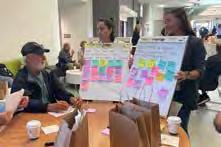
Connecting community members and researchers helps us understand the needs and experiences of the people most affected by our work. MIRA supports an engaged community network with research and learning opportunities around aging.
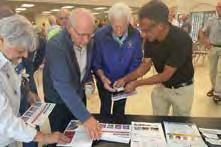
MIRA engages knowledge users throughout the research process to develop projects based on their needs and delivers timely, relevant, actionable evidence to optimize the aging process for everyone.
Much of MIRA’s support to research flows through our two focused research centres — the Labarge Centre for Mobility in Aging (LCMA) and the MIRA | Dixon Hall Centre. At these centres, diverse research skillsets, critical resources and the insights of knowledge users crystalize as bold research.

The Labarge Centre for Mobility in Aging (LCMA), examines the biological, behavioural, technological and environmental factors that can affect individual and community mobility in older adults.
Formed in partnership with Dixon Hall — a multi-service agency supporting older adults — the centre is enhancing research with, and services for, older adults living in the community.
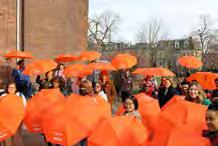

Aging publications at McMaster
Since the inception of MIRA in 2016, the
MIRA researchers’ success with tri-council funding
Over the past five years, MIRA members have exceeded the McMaster average success rates for securing SSHRC Partnership Development Grants, NSERC Discovery Grants, and CIHR Project Grants

This year, MIRA members turned MIRA- and LMCA-funded research into an additional $7.49 million in research funding:
$3,776,256 leveraged through MIRA-funded research
$3,715,443 leveraged through LCMA-funded research
In 2023, MIRA worked with partners to invest $1.8M into research and training at McMaster:
MIRA/LCMA INVESTMENT
PARTNER CONTRIBUTIONS
RESEARCH GRANTS TRAINEE FUNDING
$713,000 in MIRA/LCMA support for research grants
$349,500 in MIRA/LCMA support for trainees
$428,000 in co-funding or matched cash from partners for research grants
$288,000 in co-funding and matched cashed from partners for trainee support
$1,062,500 in total 2023 MIRA/LCMA investment in research and trainees
$716,000 in partner funding attracted by MIRA to match or co-fund aging research at McMaster
Additionally, MIRA invested $1.6M in scaling and developing its major programs of research

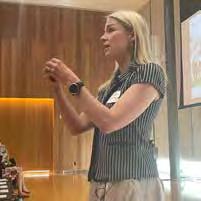
Launch of Voice Canada with speaker Jennifer Heisz, Snacks and Science with speaker Anthea Innes, Hooker lecture with speaker Cathy Sherrington, Older Adults Open Campus Day, Building Communities for Aging Better with MIRA’s ISAC, Looking to the future: Reimagining medical support in long-term care and assisted living with speaker Paul Katz, Oakville Seniors Fair, BIRMAC Tale of Two Cities (sessions held in Hamilton and Birmingham UK).
2023 MIRA & Labarge Knowledge Exchange, MIRA | Dixon Hall Centre Townhall, Canadian Conference on Research Administration (CARA) in St. Johns, NL, Canadian Association of Gerentology (CAG) conference and World Non-Communicable Diseases Congress (WNCD 2023) in Toronto.
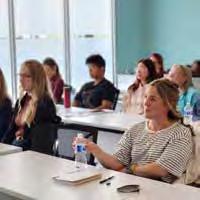

Design Thinking workshop with adjunct MIRA member PJ White from South East Technological University (SETU) Ireland; macPAGE kickoff talk with Léa Ravensbergen, Faculty of Science Graduate workshop, trainee Pitch Your Project event, scientific seminar Hooker lecture with Cathie Sherrington of the University of Sydney; National Research Council of Canada Aging in Place kickoff, MIRA leadership workshops, BIRMAC Tale of Two CIties, AURA Research 101, early career researcher luncheon, IPRC Pain Day workshop, MARC transportation mobility kickoff, MIRA’s Fall Funding Webinar and seven #TraineeTalks for trainees to connect and share their work.
New website launched in October 2023

STRIDE down the hall: MIRA members use motion capture and wearable tech to improve surgical decision making
MIRA members Dylan Kobsar, Kim Madden and Anthony Adili are leading research to bring markerless motion capture and wearable technology into an orthopaedic clinic. Learn how their work could improve the outcomes of joint replacement surgery, improve quality of life and address wait times for surgery.
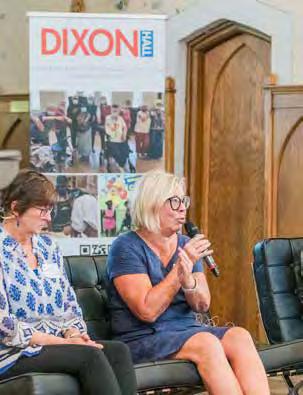
MIRA’s International Scientific Advisory Committee returns to Hamilton In October 2023, MIRA’s International Scientific Advisory Committee (ISAC) gave guidance to our major programs of research and shared their global perspectives on building age-friendly communities with our partners and their clients at Dixon Hall.
Next steps for mobility research: Parminder Raina and Marla Beauchamp on MIRA’s collaborations with the World Health Organization What does it really mean when researchers talk about mobility? MIRA researchers are working with the World Health Organization (WHO) to help improve the global understanding of mobility during the UN Decade of Healthy Ageing.

2023 MIRA and Labarge Knowledge Exchange
Presentations, posters and a full house — this year’s knowledge exchange showcased many great projects led by MIRA’s members and trainees.
Curve ahead: MIRA trainee Alex Mayhew wins research prize
Inspired by WHO childhood growth charts and using data from the Canadian Longitudinal Study on Aging, MIRA trainee Alex Mayhew’s award-winning research illustrates the changes people experience while aging.

older adults in research
Impactful research needs older adults who are keen to participate in the work. We are fortunate to regularly connect with community members with much to share.

MIRA’s collaborative efforts build research capacity, foster innovation and infuse an aging perspective from McMaster to the UK and beyond. See how we are working with partners like the University of Birmingham to widen our reach and strengthen our impact.

Navigating the academy: agefriendly transportation research moved Léa Ravensbergen from Hamilton to Oxford and back
Interdisciplinary collaborations and partnerships beyond academia have helped MIRA member Léa Ravensbergen follow a career path from MIRA trainee to McGill, to Oxford and back to McMaster.

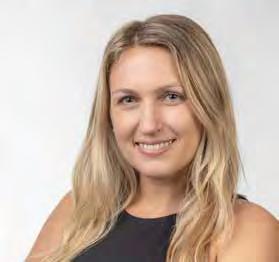
Everyone has a story to share and through the Voice Canada platform, we are helping to bring those forward in research.
Evidence-based knowledge mobilization: The McMaster Optimal Aging Portal
Another successful year for the Optimal Aging Portal, a trusted source of evidence-based information for everyone who is aging.
 Voice Canada
Voice Canada
At McMaster, our impact comes from the ideas we champion, the creativity we nourish and expertise we apply. We are a top 100 university globally because of our commitment to addressing the big ideas that advance human and societal health and well-being locally, nationally, and internationally.

McMaster’s world-renowned research on aging is a key factor in our success. Led by MIRA, McMaster has become a hub for finding ambitious interdisciplinary solutions to the most pressing issues faced by people as they age. This a testament to the tremendous expertise and dedication of the faculty, staff and trainees at McMaster who are focused on this critical area of research, in all its complexity.
Since it was created, MIRA has served as a model for successful research institutes at McMaster and has helped accelerate the university’s research programs beyond areas directly tied to aging. This past year was no different and many impressive accomplishments are outlined in this report.
McMaster would not have been able to foster this remarkable growth in aging expertise and impact without the university’s former chancellor Suzanne Labarge whose generosity has brought many great ideas, developed by many talented people, to life.
I would also like to extend my thanks to the community members who engage with our researchers across the university and through MIRA. You are all part of making the world a better place to age.
Please enjoy this year’s report.
Dr. David Farrar
President and Vice-Chair, McMaster University

It has been my great pleasure to champion aging research at McMaster University. This is a domain that we, at McMaster, are uniquely positioned to address, not only by responding to the immediate needs of our communities and policymakers but by anticipating critical trends and shifts as they develop. By leveraging strengths from across the University and beyond — connecting researchers, trainees and the community in interdisciplinary teams and partnering to support aging research through other institutes — MIRA’s tireless work in 2023 has brought greater international recognition and impact.
Underpinning the Institute’s success in research has been its strong operational and enabling infrastructure. The seeds MIRA plants across campus flourish into new research programs, projects and teams focused on what matters most to older adults. The number of faculty members who now count aging as a core component of their research portfolios has reached a level that would not have been possible without the ongoing support of MIRA.
And MIRA’s work would not be possible without the very generous and visionary support of Suzanne Labarge, a longstanding advocate for aging research. Thank you, Suzanne.
I hope that everyone enjoys reading this report and learning about the exciting and impactful work happening under the auspices of MIRA.
Dr. Susan Denburg
Strategic Advisor to the Dean and Vice-President, Faculty of Health Sciences and Professor, Department of Psychiatry and Behavioural Neurosciences



As Chair of the MIRA International Scientific Advisory Committee, I am fortunate to enjoy a front-row seat to MIRA’s many accomplishments in the field of aging research. I am further privileged to share this view with my ISAC colleagues who are leaders in aging research from around the globe.
It is always rewarding to visit Hamilton and see the work of MIRA in person. In October 2023 we were able to do so for the first time in a few years. In Hamilton, we heard updates from MIRA’s existing major programs of research, reviewed the proposals for new major programs of research, discussed the future directions of the Institute, and shared our perspectives on how MIRA could best position itself to advance aging research locally, nationally, and globally.
For the first time, members of the ISAC also had the chance to visit Dixon Hall in Toronto and see for ourselves the good work this organization does in the community. We all felt that partnering with Dixon Hall and its Senior’s Services Department would be a good fit for MIRA and expand its societal impact. Both organizations are focused on first listening to needs of older adults and then with them finding creative solutions to their challenges. ISAC members were honoured to participate in the public event Building Communities for Aging Better supported by the MIRA | Dixon Hall Centre. ISAC members brought international knowledge to the work being done at Dixon Hall and in turn, heard the community’s perspective on aging well.
MIRA plays an important and expanding role in aging research through its internal accomplishments, partnerships with dynamic organizations like Dixon Hall, and international networking. I and the other members of the ISAC look forward to seeing the future it is leading us towards.
Dr. David Hogan, University of Calgary O’Brien Institute for Public Health, Cumming School of Medicine
Legend of McMaster Faculties
BUS DeGroote School of Business
ENG Faculty of Engineering
FHS Faculty of Health Sciences
HUM Faculty of Humanities
SCI Faculty of Science
SOSCI Faculty of Social Sciences
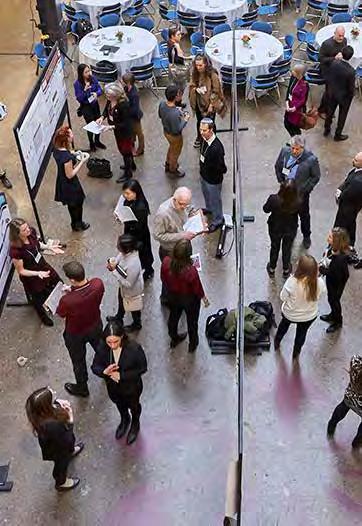
The depth and breadth of aging research at McMaster has matured significantly since MIRA was established 2016. With each passing year there are more researchers and more projects focused on aging. At the same time, these projects are bigger, farther-reaching and more impactful. Recognizing the Institute’s changing role at McMaster and the maturation of our researcher’s projects, in 2023 we introduced a few changes to how MIRA supports research.
This year the call for new LCMA Catalyst Grant applications was paused. As a funding source aimed at enabling new research connections and building interdisciplinary approaches to developing ideas, the timing was right to evaluate the role of this type of grant in McMaster’s research environment. MIRA did however continue to partner with other institutes at McMaster and externally to provide catalyst grants to help aging research reach deeper into related domains and connect expertise in those topics into the field of aging at the University.
The launch of the MIRA | Dixon Hall Knowledge Synthesis grants in November reflects MIRA’s responsiveness to the needs of knowledge users and an ongoing commitment to supporting research that impacts end-users. These new grants will connect our researchers to areas of most need and opportunity as identified by staff, leaders and clients at Dixon Hall.
MIRA’s projects made significant strides in 2023. Two new major programs of research are near their official kick-offs, catalyst grant projects from past years are leveraging MIRA support into increased funding and new funding and partnerships are building opportunities for our members to tackle the most pressing issues facing older adults, caregivers and policymakers.
This research program addresses issues specific to early mobility limitation in older community-dwelling Canadians.
In the spring of 2023, MacM3 applied for additional funding to support two new sub-studies. The Aging, Infection and Mobility (AIM) sub-study, which is using wearable technology to understand the long-term functional impact of COVID-19 in community-dwelling older people, received $300,00 through a priority announcement in 2023. In early 2024, the results of the Canadian Institutes of Health Research (CIHR) Fall 2023 Project Grants were announced, awarding another $100,000 to the project. The SMARTMOVE substudy received $100,000 through the same competition to validate clinically relevant mobility measures derived from wearable technology.
Looking into 2024, MacM3’s analysis of the qualitative study component on older adults’ perception of the earliest changes in their mobility, and machine learning analysis of data from the Canadian Longitudinal Study on Aging (CLSA) to find the most relevant predictors of early mobility problems are now both nearly complete. The study’s recruitment goals for both the Hamilton and Toronto sites are on track to be reached in spring 2024, with 20-month follow-ups beginning January 2024. Additionally, MacM3 is one of the foundational projects being leveraged for a $24 million New Frontiers in Research Fund, Transformation Competition grant being submitted in January 2024.
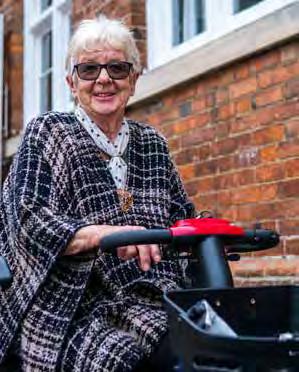


In this program of research, interdisciplinary researchers have partnered with local older adults and community service providers to co-design and test an innovative group-based community program to promote mobility amongst older adults in neighbourhoods facing health inequities.
This year, the EMBOLDEN pilot, which was delivered virtually, showed the program was feasible and acceptable to older adults and providers. However, participants expressed a preference for in-person delivery. Following from the pilot, the EMBOLDEN randomized control trial was adapted to include inperson delivery, longer duration (12 weeks) and new recruitment approaches. The 12-week program has been completed in four Hamilton neighbourhoods as part of the main trial, with 138 participants. A session is now underway with a second cohort of participants, and in winter 2024 the project will move to the Corman and Greenford neighbourhoods before returning to Hamilton’s lower city and Toronto neighbourhoods in the spring and summer of 2024. A preliminary analysis of participants’ social networks revealed they were relatively small at the outset (<3 members). At follow-up, participants’ network size, frequency of contact, and diversity of networks had all improved.
In October 2023, EMBOLDEN were invited by the Public Health Agency of Canada to contribute to a Pan American Health Organization (PAHO) call to identify and collect national, subnational, and local experiences of intersectoral action that have directly or indirectly contributed to health equity.
In October, the MIRA International Scientific Advisory Committee heard presentations from the two new Major Programs of Research in development. Their feedback and insights are helping project teams refine their proposals for success and impact.
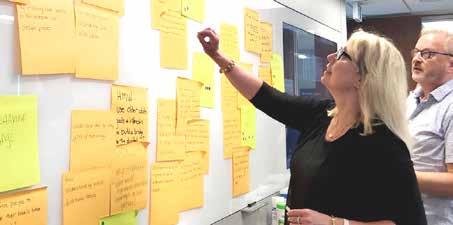
and Participation
Gaps in technology access, use and embracement create digital divides between older adults and other populations — a divide that widens further when socioeconomic factors, race, gender and new immigrant status intersect with age. As information and communication technologies become increasingly pervasive, people left behind in technology access and use are highly disadvantaged.
The objective of this research program is to improve mobility and wellness among older Canadians, utilizing effective design to bridge divides in access, use and embracement of technology.

Post-Acute Care Intervention for Frailty using Information and Communication technology
Frailty can negatively impact a person’s physical, functional, social and mental health. Having to stay in hospital is quite stressful for older people, and being frail makes recovery harder. This research team believes a package of treatments and local programming can make life better for older people with frailty going home from hospital.
Designed with input from older adults and those who take care of them (family members, doctors and nurses, and people from community organizations in Hamilton), this study’s goal is to package, in new ways, evidence-based treatments and programs already happening in Hamilton. An easy-to-use computer platform will keep study participants in contact with researchers.
MIRA-iGeN is building Canada’s first intergenerational platform to look at trajectories of aging across generations and how different networks of family connections help support mobility and healthy aging in place.
To date, 2,235 participants have enrolled in the MIRA-iGeN index sample and completed the baseline questionnaire.

In preparation for the study’s next phase of recruitment — enrolling family members — the team worked closely with the iGeN child and youth measures working group to finalize tools aimed at reaching the younger population. Project leads also consulted colleagues on critical topics around engaging racially and ethnically diverse communities and to ensure potential sampling issues are addressed in advance. Consultation with Dr. Melissa Wake, the scientific director of the Generation Victoria Study (GenV) — a longitudinal birth and parent cohort in Australia — resulted in valuable insights on meaningful engagement with racialized groups, recruitment, working collaborators, building continued funding and how to incorporate intervention studies. MIRA team members have provided support to iGeN in developing plans to integrate co-design methods into the study, with further exploration of this aspect planned for 2024.
Leveraging CLSA infrastructure, iGeN engaged IT staff to modify CLSA data management software for use in iGeN. Recruitment was paused during data migration to the new system, which gave the team an opportunity to focus on establishing relationships with community organizations to promote the study through social media and community events. During this time, the team compiled an extensive repository of community organizations in target areas, particularly those that serve racialized communities.
Team members met with Hamilton Public Health Services (HPHS) officials, including the Director and Chief Nursing Officer in the Healthy Families Division of the Healthy and Safe Communities Department. A collaboration with HPHS has been established and they will promote iGeN through their programming and iGeN will present to public health staff.
Older adults hospitalized for acute medical problems are at risk of significant functional and mobility decline during hospitalization. This project is studying the use of wearable sensing technology that collects continuous granular data on mobility to help characterize the relationship between mobility, function and health.
Following on from an assessment of the feasibility and acceptability of wearable active sensing devices in 50 older adults, the team is working on next steps to develop a customized wearable device that integrates mobility sensing technology with Onboard Machine Learning algorithms to provide a point-ofcare assessment, prediction of mobility trajectory and customize early mobility programs (EMP) that will help mitigate poor outcomes. The next phase of the study will include a comparison of the impact of EMP versus no EMP on mobility and health outcomes.
In 2023, the team secured funding from Mitacs to support a postdoctoral fellow, who will work on this project to analyze the data collected and assist in writing and applying for external grants for the next phase of this project.

Many older adults experience osteoarthritis (OA). Total joint replacement can improve quality of life for older adults but involves a risk that the patient’s condition does not improve as expected. A team of researchers from McMaster and St. Joseph’s Healthcare Hamilton are working to provide in-clinic data to assist with critical decisions about the risks and benefits of joint replacement.
“Quality data on patients’ gait and mobility would help clinicians prioritize who has the highest need for surgery and tailor treatments, which may not need to be surgical, towards the best, most appropriate outcomes,” says MIRA Member Kim Madden, one of the study investigators. “The measurements that we are doing with motion capture systems have traditionally been done in very specialized labs. With new technologies, we can now objectively measure how people walk in a regular hospital hallway.”

To provide in-clinic data, the team are testing a calibrated system of 10 motion capture cameras installed in the hallway of a hospital clinic at St. Joseph’s Fracture and Orthopaedics Outpatient Clinic. Through computer vision algorithms, this system quickly identifies individual body parts and determines the angles of knees and other joints.
Study participants meet with the surgeon and other members of the clinical team, and complete mobility tasks - balancing, walking a short distance, standing up from a chair and climbing two steps - all monitored by the hallway camera system, and then wear a sensor at home for a short period. “The motion capture systems give us great detail about a key set of movements across the controlled surface of a clinic hallway,” says Dylan Kobsar, Principal Investigator for the study along with Anthony Adili. “However, by connecting that to the rich data wearable sensors provide, we’re creating an even more accurate picture of a person’s mobility in their day-to-day lives.”
This work built on a 2019 Catalyst Grant project led by Janie Wilson, whose team developed the clinical tool that enabled collection of information on patient’s mobility and joint function.
This data could help people avoid unnecessary surgeries, support tailored treatment plans and save the healthcare system money. It just takes a few steps to get there.
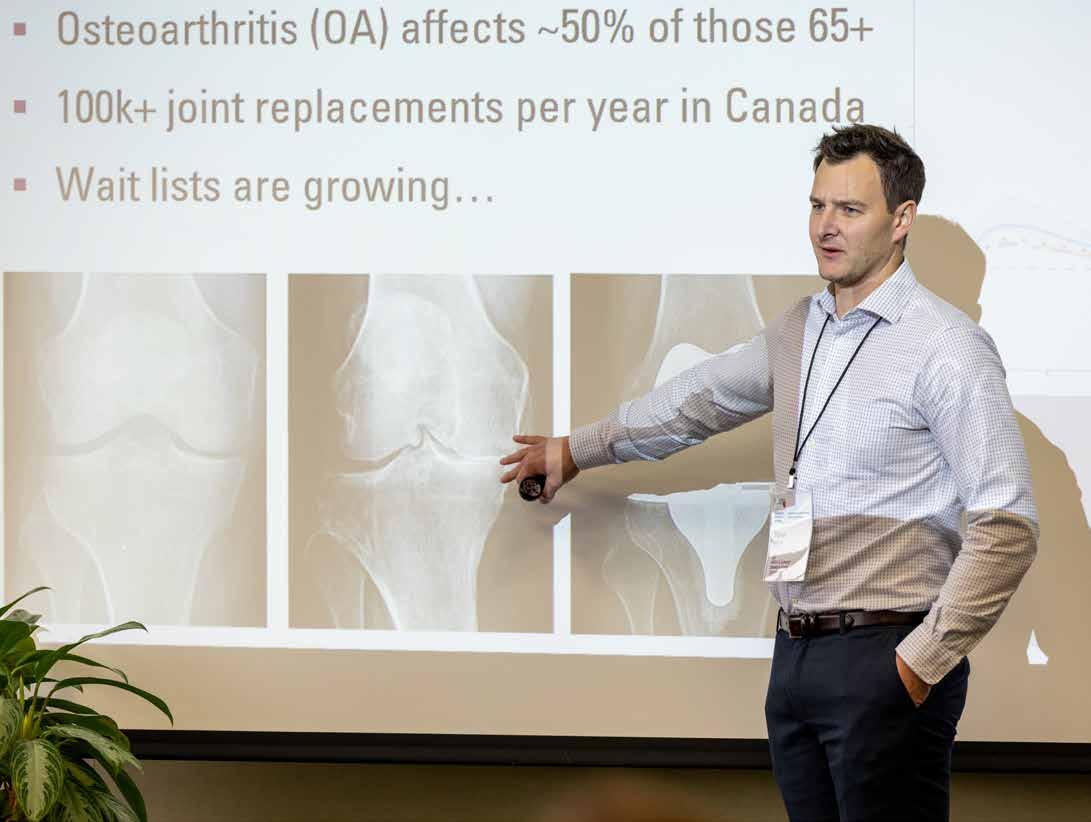
This valuable research infrastructure was supported by a 2022 Labarge Catalyst Grant in Mobility in Aging, which also contributed to the development of this interdisciplinary team. The project, Integrating innovative technologies into an orthopaedic clinic to support decision-making and personalized care: a feasibility study was led by investigators Dylan Kobsar (above), Anthony Adili, Kim Madden and Rong Zheng.


Matiar Howlader (ENG), Alex Andronov (SCI), Gurmit Singh (FHS), Harsha Shanthanna (FHS) and Dinesh Kumbhare (SCI)
MIRA/IPRC Catalyst Grant in Aging and Pain
Aging results in the dysregulation of physiological parameters commonly associated with chronic pain, which is not sufficiently quantitatively measured. The team will leverage their research expertise in electrochemical sensors (Engineering), nanomaterials synthesis (Science) and chronic pain (Health Sciences) to develop nanomaterials-based electrochemical sensors used to detect levels of glutamate, interleukin-6 (IL-6) and other biomarkers in biofluids like blood and saliva.
Implications are a quantitative, precise, real-time monitoring system of positive correlates of pain sensitization and development of a system to objectively measure chronic pain. This could lead to at-home patient monitoring, meaning greater independence, improved quality of life and reduced socioeconomic burden.
Further potential outcomes include improved assessment of chronic disease progression and efficacy of treatment, and expansion of application of this sensor system to diagnose other diseases.

PRG-4: Application in the treatment of dry age-related macular degeneration

Heather Sheardown (ENG), Ryan Wylie (SCI), Varun Chaudhary (FHS) and Aftab Taiyab (FHS)
MIRA Catalyst Grant in the Biology of Aging
Age-related macular degeneration (AMD) — a leading cause of blindness in developed countries — progresses from a dry form to a wet form with an increasing incidence of visual impairment. In some cases, the wet form of the disease can be treated with painful and expensive monthly injections into the back of the eye. The dry form has no effective treatment.
Proteoglycan 4 (PRG-4), a protein with lubricating properties commonly found in joints, has recently been shown by the team to be present in the back of the eye. It is believed that anti-inflammatory properties of this protein have the potential to provide an effective treatment for dry AMD. This project focuses on demonstrating the impact of PRG-4 on the cells of the retina under conditions of stress as well as examining the response of ocular tissue to PRG-4 treatment. The goal of the project is to understand the potential of PRG-4 or other anti-inflammatory molecules for treating dry AMD, with the aim of stopping or stalling progression of the condition to allow aging patients to maintain their vision for longer.
Heather Sheardown Matiar Howlader

Bruce, Ian (ENG), Laurel Trainor (SCI), Sean McWeeny (SCI), Kim Varian (Hamilton Philharmonic Orchestra), Micheal Stewart (First Ontario Centre), Steve Armstrong (SoundsGood Labs) and Jinyu Qian (Sonova Innovation)
Healthy Aging Canada Catalyst Grant co-funded with AGE-WELL and Canadian Frailty Network
The prevalence of hearing loss in the Canadian population increases dramatically as we age, reaching 65% for those in their seventies. Hearing aids, though beneficial in some social situations, are not well suited to listening to live music in environments like concert halls — often, even assistive systems include insufficient or incompatible wireless headsets. This project will explore several alternative assistive listening technologies that send audio signals directly to the soundprocessor chip in a hearing aid via magnetic or radio-frequency connections.
Through collaboration with the Hamilton Philharmonic Orchestra and hearing aid manufacturer Sonova, this project will study sound quality and naturalness mediated by location of the concert hall microphones, sound processing applied to the audio feed, and how the audio feed is combined with sound signals picked up by the hearing aids’ inbuilt microphones.
This research will be used to develop a set of best practices that can be adopted by music venues across Canada and around the world — removing barriers to participation in live music events for those with hearing loss thus improving social engagement, connectedness and wellbeing.


Ian Bruce Giuseppe Melacini
Giuseppe Melacini (SCI), Michael Noseworthy (ENG), Ravi Selvaganapathy (ENG), Lesley MacNeil (FHS), Dawn Bowdish (FHS) and Margaret Fahnestock (FHS)
MIRA Interdisciplinary Fellowship Grant
Age is a major risk factor for Alzheimer’s Disease (AD), which currently has no cure. Recent clinical trials have shown that suppressing soluble oligomers formed by an endogenous peptide called A β significantly slows AD progression. Targeting A β oligomers rely on antibodies that lead to severe side effects, including possibly fatal brain bleeding.
Aging significantly reduces the levels of Adenosine Triphosphate (ATP), which prevents A β self-association through a mechanism unknown because of the inherently transient nature of the A β oligomers. It is critical to find alternative approaches to safely decrease toxic A β oligomers built up during aging.
The goal of the proposed project is to dissect the mechanism of action of ATP and other nucleotides as A β oligomerization inhibitors by using spectroscopic methods recently developed by the research team aim to accurately map sites that drive transient oligomerization of intrinsically disordered proteins (IDP), such as A β, revealing how such IDP sites are affected by self-association inhibitors.
This project will expand spectroscopic in vitro studies with parallel investigations on cellular and animal model systems of neurodegeneration. Translation of atomistic models of ATP-A β interactions will potentially develop into novel methods for early AD diagnosis through efficient screening for new A β self-association inhibitors, which will serve as leads for AD therapies.


The YourCare+ Self-referral platform for home and community support services –
A proof of concept pilot toward large scale deployment
Costa, Andrew (FHS), Connie Schumacher (Brock University), George Heckman (University of Waterloo) and John Hirdes (University of Waterloo)
Healthy Aging Canada Catalyst Grant co-funded with AGE-WELL and the Canadian Frailty Network
Older adults with supportive care needs and their caregivers often have poor knowledge of and access to community services because such services are fragmented with no central points of navigation and access. YourCare+ (https://yourcareplus.ca/) is a not-for-profit, social prescribing platform that provides practical information and state of the art tools that address immediate needs to help people selfmanage care in the home. The YourCare+ Self-Referral Platform offers an automated mechanism for self-navigation based on validated assessment systems used in Home and Community Care Support Services across Ontario.
This project will conduct a proof-of-concept pilot to test the beta version of the YourCare+ Self-Referral Platform with older adults with supportive care needs and caregivers living in private dwellings. This platform allows users to digitally navigate and self-refer to home care and community support services and will generate customized lists of local service recommendations. Algorithms will identify and prioritize service recommendations based on health needs identified in the SelfReported interRAI Check-Up Assessment. Existing service directories will be integrated to generate personalized lists of recommendations that link directly to referral.

DIfferential Feasibility and Tolerability of Deep RepetitiVe TranscranIal MagNEtic Stimulation for Depression in Older Adults: A Pilot Study for the DIVINE Trial

Dante Duarte (FHS), James McKillop (FHS), Iris Balodois (FHS), Benicio Frey (FHS), Aimee Nelson (SCI), Jason Busse (FHS) and Ayse Kuspinar (FHS)
McMaster Psychiatry Department Early-Career Innovation Award co-funded by Labarge Centre for Mobility on Aging
Deep TMS (dTMS) is a new form of transcranial magnetic stimulation that uses modified magnetic H-coils to stimulate deeper brain regions. Specific H-coils are used to target dysfunctional brain regions implicated in specific psychiatric conditions. DTMS is FDA and Health Canada-approved for major depressive disorder (H1 coil), obsessivecompulsive disorder (H7 coil), and smoking cessation (H4 coil) in adults. No trials have examined the potential therapeutic benefit of the H4 (targeting the insula) and H7 (targeting anterior cingulate cortex) coils in older adults with depression.
This pilot study will explore dTMS feasibility and tolerability (i.e., side effects, impacts on mental health and cognition) of two dTMS coils (H4 and H7) in older adults with depression. It will also investigate cognitive function and changes in brain activity as measured by neuropsychological assessment and electroencephalogram (EEG).
Dante Duarte Andrew Costa
Adaptation of the CP@clinic program to improve quality of life and healthy aging in low-income urban dwellers

Gina Agarwal (FHS), Walter Tavares (University of Toronto), Natalie Kezierski (York Region Paramedic Services), Melissa Pirrie (FHS), Ricardo Angeles (FHS), Ellen Amster (HUM), Jim Dunn (Social Science), Michelle Wyndham-West (Social Science), Lauren Griffith (FHS) and Mina Mawani (Dixon Hall)
MIRA | Dixon Hall Research Grant
Low-income older adults living in subsidized housing are a vulnerable population and report poorer health. This population has a higher risk of developing multiple chronic conditions, falling, poorer mental health and experiencing poverty and social isolation. Community Paramedicine at Clinic (CP@clinic) is an innovative, evidence-based chronic disease prevention, management, and health promotion program that seeks to improve older adults’ health and quality of life — reducing their social isolation; better connecting them with primary care and community resources; and reducing the economic burden of avoidable 911 calls by older adults.
Through stakeholder engagement and early knowledge translation, an adapted CP@clinic program will be developed with modified tools and implementation guides for Dixon Hall. Both will be enhanced via continuous quality improvement, and a final program template will be developed for future program scale-up and sustainability.

Artful Aging: Creating a digital village with older adults to enhance social connectivity

Paula Gardner (HUM), Kim Sawchuck (Concordia University), Scott Bateman (University of New Brunswick), Celine LeTulipe (University of Manitoba), Derek Reilly (Dalhousie University) and Rong Zheng (ENG)
MIRA LCMA Matching Funding: Social Sciences and Humanities Research Council (SSHRC) Partnership Development Grant
Building on a 2017 LCMA Catalyst Grant supporting the development of the ABLE (Arts-Based therapies to encourage Longevity in Elder participants) platform, this SSHRC Partnership Development Grant will support the scaling and evaluation of ABLE Village across Canada. ABLE Village will be open-access, free, accessible on any digital device and offer an inclusive space where older adults can socialize, learn, and play. The village approach engages critical age, feminist and crip principles that prioritize social engagement.
ABLE will offer virtual socialisation and activity spaces and ArtPlay experiences — including arts and crafts, movement, theatre and play — that counter isolation and loneliness by providing opportunities to learn, engage, and share interests among older adults, family and friends. The platform aims to enhance interaction, joy, self-growth and development to support a vibrant ageing experience, longevity and enhanced social appreciation of older adults, while innovating a Qualitative Assessment Tool for older adult wellness measuring the benefits of activity and socialisation.
Gina Agarwal Paula Gardner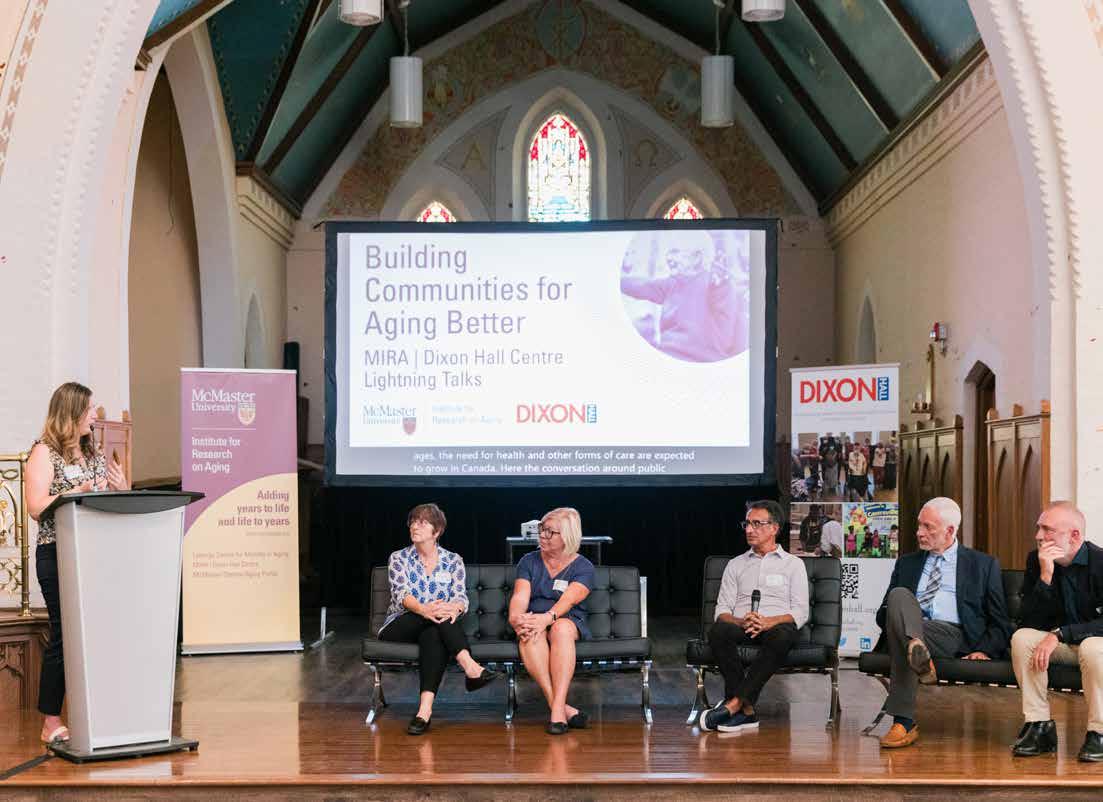
MIRA’S International Scientific Advisory Committee returns to Hamilton
In October 2023, the MIRA International Scientific Advisory Committee (ISAC) gathered in Hamilton for the first time in several years — bringing with them welcomed international perspectives on the work led by aging researchers at McMaster. After a long travel hiatus due to COVID, ISAC members travelling from across Canada, the UK, USA, Mexico and Sweden— including Drs. Agneta Malmgren Fänge, Wendy Rogers, Luis Miguel Gutierrez Robledo, who joined during the pandemic — connected with each other and the MIRA team while learning about exciting new research programs and community engagement strategies being led by McMaster researchers.
The meetings’ discussions began with an update by MIRA’s leadership on the Institute’s recent achievements, including new research endeavors and collaborations.
The ISAC heard from leads for MIRA’s existing Major Programs of Research (MPRs) and Strategic Initiatives, including the EMBOLDEN trial, presented by Rebecca Ganann, Marla Beauchamp spoke about the MacM3 study and Andrea Gonzalez shared an update on the MIRA-iGeN study. The ISAC provided critical feedback and insights for the existing MPRs. Developing MPRs presented their proposed research to the ISAC’s panel of international experts in aging research: Milena Head spoke about the new Aging Mobility & the Digital Divide (since re-named EMPOWrD) program, followed by Lauren Griffith presenting on the frailty-focused PACIFIC study.
Day two focused on MIRA’s work at Dixon Hall through the MIRA | Dixon Hall Centre. ISAC members began the day with a guided tour of Dixon Hall facilities in Toronto, including presentations from Dixon Hall leadership about the history of the agency and its current programming. The visit concluded with ISAC members participating in Building Communities for Aging Better, a public panel discussion that provided an opportunity for the local community to learn about global perspectives, ideas and innovations in aging research.


MIRA plays a part in building a supportive and innovative environment for aging researchers at McMaster including catalyzing new research and helping members find and apply for external support. In 2023, MIRA researchers achieved continued success, securing millions in external funding as well as other awards and recognition for excellence in aging research.
Aaron Jones received two CIHR grants totaling $165,000 for research that looks at the role of home care payment source on health outcomes. Jones’ collaborators include fellow MIRA member Andrew Costa and previous MIRA and Labarge-funded PDFs Alexandra Mayhew (2022), Caitlin McArthur (2017), and Chi-Ling Joanna Sinn (2021).
Teams with Ada Tang as an investigator received over $380,000 in new funding from CIHR, KGH Foundation Stroke Innovations Grants and other sources to support her work on exercise and stroke recovery.
Alison Shea received a CIHR Project Grant: Women’s Health Research for $100,000 for her work developing a national database for menopause and premature ovarian insufficiency. Shea delivered a MIRA One Topic, Two Disciplines seminar on the topic in 2022.
Anthony Levinson and the Optimal Aging Portal team were awarded over $400,000 in funding from the Public Health Agency of Canada’s Dementia Strategic Fund (DSF). This two-phase project — including a randomized controlled trial and knowledge mobilization phase called ‘dementiarisk.ca’ on McMaster’s Optimal Aging Portal — will raise awareness of dementia risk reduction strategies through online education for Canadians.
Ashwini Namasivayam-MacDonald received over $470,000 from the Alzheimer’s Society, CIHR and NIH to investigate swallowing impairments in people living with dementia, and $275,000 in CFI funding to investigate treatments for these impairments and caregiver burden.
Namasivayam-MacDonald is also a co-Investigator on a $4,284,408 USD NIH grant to establish reference values and clinical decision points for quantitative measures of swallowing.
Namasivayam-MacDonald received MIRA matching funding for her 2022 CFN early career researcher award investigating swallowing disorders in older adults.
Dawn Bowdish received a CIHR Operating Grant for $750,000 to further her work on uncovering the role of chronic inflammation and serious respiratory infections in brain aging and cognitive impairment.
Working with Bowdish, PhD student Sofya Ermolina generated the critical pilot data to enable this successful grant application through her MIRA | Global Nexus funded Scholarship exploring inflammation and post-pneumonia cognitive decline. MIRA funding enabled the production of four publicly available protocols on the Bowdish lab website.
Diana Sherifali is a PI on a team who received a total of $6,858,088 in funding through CIHR, Public Health Agency of Canada and the National Health and Medical Research Council of Australia for their project translating an evidence-based diabetes prevention program into diverse Canadian communities. MIRA supported Sherifali’s work on nutrition, physical activity and aging through a 2019 LCMA postdoctoral fellowship (Megan Racey) cofunded with CFN and MERST.

Greg Steinberg was elected to the Canadian Academy of Health Sciences and named a Clarivate highly cited researcher. A research team led by Steinberg and 2021 MIRA Interdisciplinary fellow Dongdong Wang published research on the antiaging effects of metformin in the journal Nature in June 2023.
Jennifer Heisz — a member of the MIRA Executive Committee providing insight and guidance to the Institute’s activities — was appointed University Scholar, recognizing her work in aging, exercise and the brain. Heisz has served as a mentor to LCMA postdoctoral fellows, Alexandra Mayhew (2022) and Vanessa De Rubeis (2023).
2022 MIRA postdoctoral fellowship recipients Jeremy Walsh and Geoff Coombs received a $25,000 Healthcare Professionals Research Grant from the Alzheimer’s Society of Brant, Haldimand Norfolk, Hamilton and Halton.

Manaf Zargoush, whose work was supported with a 2018 Labarge Catalyst Grant, received a CIHR Project Grant for $595,000 to support his work in understanding the balance of care for older adults at risk of hospitalization with a discharge delay.
Margaret Fahnestock and Sam Sadeghi received a CIHR Institute of Aging Project Grant for $1,239,300 to evaluate the mechanisms of neurodegeneration in aging and Alzheimer’s Disease. This built on the 2022 MIRA Scholarship work by Sama Jaberi, whose project used PET tracers to describe mechanisms of neurodegeneration in aging.
Marla Beauchamp and fellow MIRA researchers Lauren Griffith, Andrew Costa, Ayse Kuspinar, MyLinh Duong, Julie Richardson, Bruce Newbold, Paul McNicholas and Parminder Raina received a CIHR project grant for $300,000 to extend analysis of the MacM3 cohort to understand risk factors and impacts of post-COVID conditions in community-living older adults.
Maura Marcucci, recipient of the 2021 Labarge-IPRC Catalyst Grant, received a $750,000 CIHR Operating Grant to support her NeuroVISION-2 Biobank Initiative, exploring age-related cognitive decline and perioperative brain injury mechanisms.
A BMC Geriatrics paper on a transitional care intervention for older adults with stroke and multimorbidity, co-authored by MIRA researchers Maureen Markle-Reid, Kathryn Fisher, Marla Beauchamp, Rebecca Ganann and former MIRA trainee Carly Whitmore was selected by the Canadian Association for Health Services and Policy Research 2023 conference as one of the top five studies.
Nicole Dalmer, supported through 2021 MIRA PDF Stephanie Hatzifilalithis, was awarded the Canadian Association for Information Science 2023 Emerging Leader Award for her work on digital literacy and older adults.
Patricia Liaw was awarded a CIHR project grant of $794,086 for her work examining the impact of age on plasma DNA and immunothrombosis pathways in sepsis.
Jenna Smith-Turchyn received a CIHR Project Grant ($164,476) and a SSHRC Insight Development Grant ($53,959) both building on her 2022 LCMA Catalyst Grant focusing on understanding and supporting older adult survivors of cancer.
Building on work supported by a 2022 LCMA Catalyst Grant, Smith-Turchyn led a team including several MIRA researchers that received a $53,959 SSHRC Insight Development Grant to compare the effects of social supports on quality of life and activity levels in older adult survivors of cancer.
Lisa Carlesso, supported through 2022 MIRA | IPRC Scholarship recipient YV Raghava Neelapala’s work phenotyping pain in knee osteoarthritis, received an Arthritis Society Innovation Grant of $100,000 for work combining transcranial direct current stimulation and yoga to improve pain management for knee osteoarthritis.
Building on work supported by a 2017 LCMA Catalyst Grant, Paula Gardner led a SSHRC Partnership Development Grant that secured $572,200 in combined SSHRC and partner funding, including $20,000 in MIRA/LCMA funding, to support the development of ABLE Village, a virtual social and arts space with activities for older adults.
2018 and 2021 Labarge Catalyst Grant recipient Suart Phillips was named Distinguished University Professor Phillips is a co-lead of the EMBOLDEN project and has been supported by Labarge Scholarships for PhD student Tanner Stokes (2018) and Giulia Coletta (2019).
Parminder Raina and Marla Beauchamp on MIRA’s collaborations with the World Health Organization
MIRA’s scientific director Parminder Raina and Marla Beauchamp, associate scientific director of the MIRA | Dixon Hall Centre, sat down for an interview about collaborating with the World Health Organization (WHO) and the new framework for measuring mobility this collaboration has fostered.
There seems to be a growing body of work at MIRA on understanding aging and mobility globally. How did MIRA begin collaborating with the World Health Organization?
Parminder Raina MIRA’s collaboration with the World Health Organization began almost five years ago with our contribution to the baseline report on the UN Decade of Healthy Ageing, 2020. Following this, MIRA has developed significant and ongoing collaborations centered primarily on measurement issues in mobility, life course, and an intergenerational approach to aging.
Marla Beauchamp In our recent collaboration around measurement and mobility, the WHO commissioned MIRA to do two systematic reviews. One was on life-space mobility measures led by Dr. Ayse Kuspinar, and the other was on general self-reported measures of mobility. Through both reviews, we saw a lack of clarity on the different ways mobility is measured and conceptualized in research and practice. And so, we proposed a new conceptual framework for how to assess and measure mobility from a comprehensive lens.
How does this framework address the issues you see in the field of mobility research?
MB It’s important that, if we’re measuring the same constructs, we use the same language for the same ideas. Without a common starting point, it is difficult to meaningfully compare results between studies and draw broader interpretations on a topic.
Our framework addresses this by focusing the conversation around three types of mobility: perceived mobility ability, locomotor capacity for mobility, and actual mobility. Perceived mobility is what people believe they can do. This might be reported with questions like ‘how difficult is it for you to climb the stairs in your home on an average day?’ When we measure locomotor capacity, we are looking at the limits of a person’s mobility, that is, what they have the capacity to do. This would usually be something measured in a lab, where we conduct physical tests of mobility in a standardized way. Finally, actual mobility reflects what people actually do in their dayto-day lives. For example, how much someone walks or how far they travel from home.
Up to this point, most of the research has focused on perceived mobility (what people say that they can do), and mobility capacity based on common lab-based measures of physical performance. Where we don’t have a lot of data or as reliable measures is the actual mobility people perform in their daily lives — which is why our work with wearables is so important through projects like MacM3 or the CLSA. We further believe this proposed framework can be adapted past just mobility and used for other domains of functional ability.
PR This ties into the Decade of Healthy Ageing and the WHO’s healthy aging framework, which also has three components: environment; intrinsic capacity, that is, your physiological and biological predisposition;
and function. Mobility is a major contributor to the domain of function, but on the intrinsic capacity side, the WHO has emphasized the aspect of locomotion. The same tools and language are currently used to measure locomotion and mobility, but how you interpret that can be different. Our framework can help clarify what people are talking about.
What will the clinical impact of this work be?
MB Mobility is going to be a key measurement for clinicians involved in programs targeting older people or healthy aging. This framework is relevant for answering the question “how should I measure mobility in my patients?”
The conceptual framework addresses the issue that the different facets of mobility — perceived, capacity and actual — have different measurement properties. Some might be more sensitive to change while others might be more predictive of health outcomes down the line. I think that as we use this framework to delineate between the three facets, we will see more and more clinical relevance.
The WHO has already identified this area as critical for older adults globally, what do you see as the policy impact of this research?
PR The policy impact is going to be measured over the next 10 to 15 years. The framework, along with the two systematic reviews that made it clear there was a need for the framework, were published in a special WHO supplement of the journal Age and Ageing.
The MIRA-led systematic reviews were the only two papers from that issue with specific recommendations that will be implemented in the WHO Study on Global Aging and Adult Health (SAGE). This has a direct impact on policy, as the results of that survey are frequently used when UN member states develop policies that benefit older people.
What are the next steps for this collaboration and the research it is enabling?
MB We are developing a proposal to create a measure that captures all mobility domains described by the WHO in the same tool. And we aren’t starting from scratch, we are actively looking at leveraging existing measures and data collected in MacM3 and CLSA.
We now have a framework that identifies where the gaps are in the field. It’s clear that a major gap is measurement of actual mobility, which right now is not collected consistently. This information will guide our continued work with wearable technology through initiatives like SMARTMOVE and MacM3; to really understand the value that these novel measures can bring us.
PR MIRA has positioned itself well in the mobility and aging spaces. We are now having national and international visibility in collaborations. Our goal to establish a WHO collaborating centre has built far beyond our initial intention, and requires long-term collaboration on different areas, across different initiatives.
We are engaged in a collaborative case study looking at life course influences for healthy aging in Canada. One of my trainees, Vanessa De Rubeis, who has a joint position between MIRA and WHO, has been looking at what kind of data is available in Canada to address issues of healthy aging as conceptualized by the WHO.
Another developing collaboration is a systematic review on measuring risk of fractures in postmenopausal women. That is just beginning and again, informs the work of the WHO in building the whole set of indicators for the Decade of Healthy Ageing, 2020.

Partnerships are a cornerstone of MIRA’s approach to optimizing the longevity of community members. This year we worked in new ways and with new partners to further our common goals.
MIRA and internal partners have been able to open new opportunities for highly motivated graduate students and postdoctoral fellows to pursue aging research at McMaster through co-funding agreements. New in 2023, MIRA opened a call for cofunding graduate scholarships with five partners: the Firestone Institute for Respiratory Health (FIRH), Michael G. DeGroote Institute for Infectious Disease Research (IIDR), Smart Mobility for the Aging Population (sMAP), McMaster Digital Transformation Research Centre (MDTRC) and Michael G. DeGroote Institute for Pain Research and Care (IPRC).
Ongoing collaborations continued to strengthen connections between MIRA and clinical researchers. In partnership with IPRC, MIRA facilitated a Catalyst Grant in Aging and Pain for a second year, and collaborated with McMaster’s Department of Psychology, Neuroscience, and Behaviour to co-fund an Early Career Innovation Award.


MIRA partnered with AGE-WELL to bring two Healthy Aging Canada Catalyst Grants to McMaster, and to co-fund one PhD scholarship and two AGE-WELL EPIC-AT Master’s Fellowships. MIRA has also engaged AGE-WELL to be the first external partner to join Voice Canada, the MIRA-led online engagement platform connecting research and community through study recruitment, promotion of aging research-related events and opening dialogues on big research questions.
Partnerships in the academic and research sectors work to expand MIRA’s capacity. Humber College and Mohawk College both engaged with MIRA seeking opportunities for students to engage in the Institute’s work, to enhance their skills in communitybased research, and to explore mutual interests in aging’s impact on wearable technologies, work, entrepreneurship, the built environment, and aging in place. Exploratory meetings occurred throughout 2023, culminating in the signing of a memorandum of understanding with Humber College in August.
MIRA collaborated with the National Research Council (NRC) to connect researchers on mobility, brain aging, technology, aging in place, and healthy aging metrics. In June, the NRC hosted a workshop on the Aging in Place Challenge program, linking 12 NRC and 33 MIRA researchers. Joint funding applications were submitted by MIRA members, leading to two projects advancing to the second round in January 2024.
Newcastle University’s National Innovation Centre Ageing (NICA) has long been a valued partner of MIRA. In 2023, discussions centered on potential collaborations, including NICA-led projects like the City of Longevity (enhancing age-friendly cities through a proactive approach to aging) and the Internet of Caring Things (leveraging digitally connected objects to support aging well). These initiatives, in line with MIRA’s mission, could integrate well with Dixon Hall’s efforts. Ongoing talks involve NICA, Dixon Hall, and MIRA, exploring models to engage charitable foundations as partners and funders for implementation. This partnership also advances MIRA’s ambition to establish a center for aging innovation in Hamilton.
In 2023, MIRA focused on strengthening clinical research as a strategic priory. The Institute partnered with St. Joseph’s Health System Centre for Integrated Care (CIC), aiming to enhance integrated care solutions and research initiatives across Canada. This collaboration promotes knowledge exchange, supports MIRA in expanding clinical research work beyond the Institute and better facilitates joint funding applications. In early 2024, a memorandum of understanding was signed.
MIRA has taken a lead on fostering research connections and initiatives building on McMaster’s partnership with the University of Birmingham (BIRMAC). Following their collaboration on the Inclusive Spaces for Aging Well event in 2022, MIRA secured a BIRMAC Project and Ideas fund grant for their joint proposal, “A Tale of Two Cities: Exploring parallel research and initiatives into age-friendly cities, communities, and universities.” Co-PIs Audrey Patocs (MIRA research manager) and Afroditi Stathi (Professor at University of Birmingham) coordinated a delegation of MIRA researchers and staff (Stuart Phillips, Rebecca Ganann, Bruce Newbold, Allison Dubé, and Audrey Patocs) to Birmingham in June 2023, with a reciprocal visit to McMaster by Birmingham researchers in October 2023. Through activities including keynote and public lectures, design thinking workshops, facility tours and strategic meetings, they explored active aging in urban settings, particularly mid-sized, post-industrial cities coping with demographic, economic and environmental challenges. Synergies between complementary programs of research — MIRA’s EMBOLDEN and MacM3 programs, and Birmingham’s REACT trial — sparked plans for further grant applications and large-scale, international collaboration.
Thrive Group, a non-profit umbrella organization, became a partner in July through another memorandum of understanding. MIRA researchers will collaborate with Thrive on research and education, and MIRA is supporting Thrive’s application to become a Centre of Excellence through the Government of Ontario’s Ontario Centres for Learning, Research and Innovation in Long-Term Care (CLRI) program.
The Bayshore Foundation is working with MIRA and the McMaster Optimal Aging Portal (OAP) to provide evidencebased information for Bayshore HealthCare’s clients, patients, and staff.
MIRA’s partnership with South East Technological University in Ireland — focused on expertise in design thinking in aging research — led to an international presentation, a conference publication and a forthcoming book chapter on design thinking in interdisciplinary aging research coauthored by Parminder Raina and Audrey Patocs at MIRA and PJ White from SETU.
A McMaster MIRA delegation, including Dylan Kobsar, Jeremy Walsh, Michael Carter, Baraa Al Khazraji, Dean of Science Maureen MacDonald, trainee Sydney Valentino and research manager Audrey Patocs visited Myant, a tech company developing smart textiles. They discussed applying technology to aging issues, linking trainees with industry and accessing funding for academic-industry projects.
Legend of McMaster Faculties
BUS DeGroote School of Business
ENG Faculty of Engineering
FHS Faculty of Health Sciences
HUM Faculty of Humanities
SCI Faculty of Science
SOSCI Faculty of Social Sciences

Across all our work, MIRA aims to impact the long-term trajectory of aging research. Our vibrant, dedicated trainee community is central to that goal.
Interdisciplinary projects that connect MIRA researchers with trainees facilitate collaboration, foster quality of research and sustain longevity of talent. Last year MIRA supported 14 new trainee projects and formed new partnerships to support and grow aging research at McMaster.
The MIRA Trainee Network supports research at the undergraduate, graduate and postdoctoral levels; in 2023 the network had a total membership of 123 interdisciplinary scholars. Members of the network attended and presented at MIRA seminars and events; connected directly with older adults through community fairs and intergenerational activities; and — through the macPAGE program — demonstrated their dedication to aging research.
Spring 2023’s Pitch Your Project gave a stage to trainees practicing real-world knowledge translation skills, further put into practice for over 50 poster presentations at the 2023 MIRA and Labarge Knowledge Exchange in the fall. Quarterly #TraineeTalks provided a platform for members to present research and connect with peers, fostering a collaborative dynamic community that supports trainees throughout their aging research journey.
In 2023 MIRA trainees won prestigious awards, such as the DholeEddleston prize, caught the interest of national groups like the Canadian Physiotherapy Association, and contributed to research that guided provincial policy on COVID-19 vaccines. Our trainee network attracted over two million dollars in external funds to support aging research, and members were highlighted as emerging scholars on the national stage.
Our Trainee Network ensures the next generation of innovation has a solid foundation of connection, collaboration and fresh perspectives. The future of aging research is being built every day by MIRA trainees.

For work published in 2023, Alexandra Mayhew (2022 Labarge Postdoctoral Fellow) was awarded the prestigious Dhole-Eddlestone Memorial Prize. The award is given annually to the most deserving research published in the British Geriatrics Society (BGS), Age and Ageing. Led by Mayhew, the research paper “Normative values for grip strength, gait speed, timed up and go, single leg balance, and chair rise derived from the Canadian Longitudinal Study on Aging,” was inspired by the World Health Organization’s growth charts for children. Using data from the Canadian Longitudinal Study on Aging (CLSA), the team produced performance charts to identify 45- to 85-year-old adults with low physical function. These charts quantify the declines in muscle strength and physical function expected with normal aging — producing a more accurate representation of physical performance for this age group. This quantitative measurement protocol is part of a shift toward evidence-based early assessment and intervention that considers physical function and mobility inherently critical to healthy aging.
“The McMaster Institute for Research on Aging played a crucial role in assembling our multi-disciplinary team, whose diverse perspectives strengthened our development of age-specific performance charts,” says Mayhew. “These charts aim to improve identification of low physical function in mid-to-late-life older adults, enabling early interventions that preserve mobility and function. With MIRA’s support, we envision a future where these charts guide interventions to enhance quality of life through aging.”
Read the research | Alexandra J Mayhew, Hon Y So, Jinhui Ma, Marla K Beauchamp, Lauren E Griffith, Ayse Kuspinar, Justin J Lang, Parminder Raina, Normative values for grip strength, gait speed, timed up and go, single leg balance, and chair rise derived from the Canadian longitudinal study on ageing, Age and Ageing, Volume 52, Issue 4, April 2023, afad054, https://doi.org/10.1093/ageing/afad054
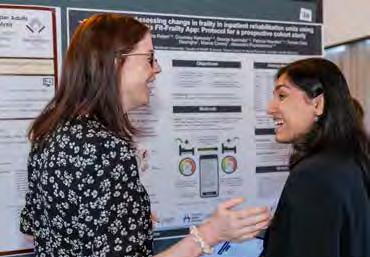


EPIC-AT Master’s Fellowship Co-Funded with AGE-WELL
Evaluating the use of the Fit-Frailty App in inpatient rehabilitation units to monitor frailty in older adults
Trainee: Aastha Relan
Supervisor: Alexandra Papaioannou (FHS)

Frailty is a medical condition of reduced health and function in older adults. Monitoring frailty helps healthcare teams plan treatments such as rehabilitation. However, current frailty assessments are not practical for routine clinical use.
The Fit-Frailty App was developed at the Geras Centre for Aging Research to streamline frailty assessment in clinical settings. Scoring is based on the Rockwood Frailty Index method and includes cognitive and physical tests, and disease-related, mood and nutrition questions.
While the Fit-Frailty App has been validated at one time-point, we predict the Fit-Frailty App will also be sensitive to change in frailty over time. By recruiting and following patients admitted to Hamilton Health Sciences rehabilitation units, this study will evaluate the use of the Fit-Frailty App to monitor any change in frailty after rehabilitation.
EPIC-AT Master’s Fellowship Co-Funded with AGE-WELL
Remote monitoring of mobility and sleep patterns in older adults using context aware smart-home technology to predict abnormal aging-related complex health issues
Trainee: Haixin Wang
Supervisor: Qiyin Fang (ENG)

This project focuses on creating a context-aware smart-home system to enhance health management in older adults by monitoring both the ambient environment and personal health data. The aim is to mitigate chronic conditions such as hypertension and diabetes, which often lead to mobility issues and immune response problems in older adults.
The study’s indoor positioning system, designed to track mobility and location data within participants’ homes with multiple beacons and a central hub, diverges from conventional neural network-based diagnostics. Instead, it provides physicians with post-test probabilities for various conditions, enabling earlier and more precise interventions.
Significant progress has been made, including completing preclinical stages, system optimization and pilot testing with high accuracy. The data analysis phase is currently underway with 13 participants, focusing on identifying predictors of mobility and cognitive decline.
Development of a wearable insole-based sensor system to determine healthy PPD (plantar pressure distribution) patterns in older adults
Trainee: Sophini Subramaniam
Supervisor: Jamal Deen (ENG)

Health monitoring in aging can allow for the maintenance of optimal health and contribute to early pathology detection and treatment. Gait characteristics — specifically, foot pressure — can be investigated to gain a better understanding of fall risk and the overall health of older adults, as well as pathology detection. This method of earlier and simpler detection can potentially identify risk factors for pathologies or falls, providing a mechanism for prevention and improvement of independence and overall wellbeing of older adults.
Wearable sensor solutions increase convenience for the user and allow for health monitoring to be more frequent, regular, and reflective of an individual’s regular physiological parameters and activities of daily living allows for healthy aging at home. The sensor data obtained through this work can lead to early disease detection, diagnosis and tracking of the progression of neurodegenerative diseases.
Role of impaired resolution of inflammation on post-pneumonia cognitive decline in mouse aging model issues
Trainee: Sofya Ermolina
Supervisor: Dawn Bowdish (FHS)
Mentor: Katrina Choe (SCI)

Community-acquired pneumonia (CAP) is caused by infection from pathogens such as Streptococcus Pneumoniae. Experiencing CAP in mid-to-late life could result in persistent cognitive impairment. This preclinical study will be the first to assess tumor necrosis factor (TNF) inhibitors as a therapeutic intervention to prevent post-pneumonia cognitive impairments in older adults.
This research aims to characterize the effects of age on post-pneumonia cognition; determine the effects of age on the resolution of inflammation in the periphery and brain post-pneumonia; and test whether reducing TNF-mediated inflammation during the postpneumonia recovery period reduces cognitive decline.
Exploring the use of physiotherapist-led tele-rehabilitation for older adults with chronic conditions
Trainee: Holly Edward
Supervisor: Jenna Smith-Turchyn (FHS)
Mentor: Stuart Phillips (SCI)

Many older adults live with one or more chronic conditions (e.g., diabetes, cancer, arthritis, etc.) These health conditions can lead to lower levels of mobility, difficulties completing activities of daily living and poor quality of life.
Rehabilitation focuses on interventions that optimize function and reduce disability and are often led by physiotherapists (PT). As a result of the global COVID-19 pandemic, tele-rehabilitation (i.e., clinical services using remote or virtual tele-communication strategies) emerged as a method to engage older adults in rehabilitation.
This project aims to summarize the characteristics of these programs and describe the effectiveness of PT-led telerehabilitation programs for older adults living with chronic conditions. We also aim to explore older adults’ barriers, facilitators and needs to engage in PT-led tele-rehabilitation programs.
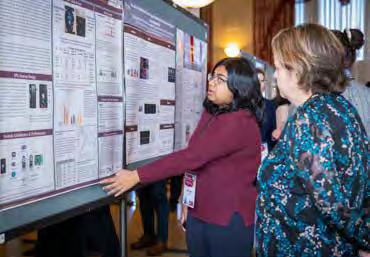
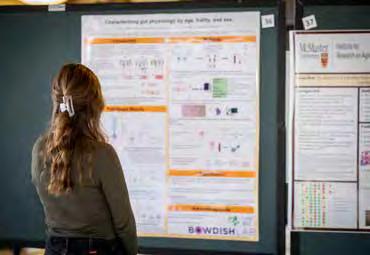

Labarge Master’s Scholarship Co-funded with sMAP
Trainee: Oishee Ghosh
Supervisor: Qiyin Fang (ENG)
Mentor: Henry Siu (FHS)

Leveraging wearable technologies and an indoor positioning system (IPS), this project further develops a context-aware system to establish baseline behaviour and monitor changes in physiological and mobility patterns for older adults at home.
Current study progress involves validation of existing clinical data and IPS system improvements for increased data quality and accuracy. Anticipated outcomes include a comprehensive system for physiological and mobility data analysis, supporting aging –in place.
This research may support work in predicting and managing neurodegenerative diseases and mobility-related disorders — potentially enabling early interventions. Key stakeholders involved in this project include older adults, clinicians, and industry partners to ensure usability and effective integration into healthcare practices.

MIRA PhD Scholarship
Development and validation of a health literacy measure for communitydwelling, low-income older adults in Thailand, the Philippines and Canada
Trainee: Jasdeep Brar
Supervisor: Gina Agarwal (FHS)
Mentor: Jim Dunn (SOSCI)

Jasdeep Brar
In Canada, 88% of older adults have low health literacy (HL), with higher rates among those experiencing social disparities such as low-income. Similarly, low HL is also highly prevalent among older adults in low- and middle-income countries, such as Thailand and the Philippines. Consequently, low-income older adults in these countries face significant challenges in accessing and understanding health information and services.
HL is commonly measured using direct face-to-face administered surveys. An indirect measure of HL could address existing challenges and provide a more comprehensive measure; however, no indirect HL measure exists.
This research aims to develop and validate an indirect HL measure for communitydwelling, low-income older adults in Thailand, the Philippines, and Canada. This project will include a systematic review, collection of HL scores based on an indirect HL measure and regression analysis examining the relationship between HL, health behaviours and chronic disease outcomes.
Raymond and Margaret Labarge Chair in Research and Knowledge Application for Optimal Aging Fellowship
Defining and understanding healthy aging among Canadian adults:
A longitudinal analysis of data from the Canadian Longitudinal Study on Aging
Trainee: Vanessa De Rubeis
Supervisors: Parminder Raina (FHS) and Andrea Gonzalez (FHS)
Mentors: Carmela Alfaro-Laganse (HUM) and Jennifer Heisz (SCI)

Aging is a complex, dynamic and heterogeneous process. An emphasis is often put on disease management when considering aging, and not on a person’s overall well-being. To optimize and understand healthy aging, a person’s intrinsic capacities and functional abilities must be considered.
The overall purpose of this project is to understand the process and define trajectories of healthy aging among Canadian adults using measures of intrinsic capacities and functional abilities; and evaluate proximal, distal, and accumulated risk and protective factors for healthy aging, including adverse childhood experiences, multimorbidity, social engagement and accumulated stress.
A novel application of multimodal wearable sensors to detect mobility trajectories in older adults living in the community: Analytical approaches within the MacM3 project
Trainee: Ben Cornish
Supervisor: Marla Beauchamp (FHS)
Mentors: Paul McNicholas (SCI) and Qiyin Fang (ENG)

Ben
Monitoring older adults with wearable sensors is a feasible and potentially transformative method to objectively and continuously measures mobility in daily life. To do this, there is a need to leverage multi-sensor, fit-for-purpose setups while not simplifying outcomes.
This research conducts a secondary analysis of the McMaster Monitoring My Mobility (MacM3) project data, a prospective cohort study of mobility in 1500 older adults. The project will develop fusion sensor analytical approaches to evaluate mobility in daily life and will develop a Mobility Complexity Index to describe the complexity of mobility in daily life. To better reveal individual characteristics of mobility over time, the index will include variability of macro and microlevel analytics while considering the personal (e.g., capabilities, mobility limitations) and environmental determinants (e.g., seasonal weather).
Relative contributions of age and frailty to respiratory infections
Trainee: Kémy Adé
Supervisor: Dawn Bowdish (FHS)
Mentors: Todd Hoare (ENG) and Jose Moran Mirabal (SCI)

Kémy Adé
Aging is associated with increased incidences of frailty, the excessive vulnerability to stressors, meaning higher susceptibility to infections and other diseases, and more severe outcomes. To measure frailty, clinical indexes have looked at the general health of a person. However, there is a knowledge gap regarding organ- and disease-specific effects of frailty.
This project focuses on respiratory infections, which inflict a high toll on older adults, using a mouse model of frailty to understand how the lung immune system changes with age, and with frailty. Research will focus on lung macrophages, which are the first line of defence against respiratory infections, to help understand what distinguishes a frail lung from a healthy one, and how these differences impact resistance to infection, which is crucial. This will allow the identification of potential targets for preventive or therapeutic interventions to alleviate respiratory infection burden in older adults.
Labarge Postdoctoral Fellowship MIRA Postdoctoral Fellowship Vanessa De RubeiMicheal Kalu was appointed Assistant Professor at York University in 2023. In addition to two peer reviewed publications in the past year, the senior health division of the Canadian Physiotherapy Association is interested in disseminating his project’s findings to its members, highlighting the importance and uniqueness of this work.

A manuscript co-authored by older adults on the EMBOLDEN Strategic Guiding Council was accepted for publication in Research Involvement and Engagement. Two peer reviewed publications were published in past year.
Maggie MacNeil was an invited participant and special rapporteur at the 2023 G7 Summit on Healthy Aging in Niagara in November. The Royal Society of Canada highlighted MacNeil as part of the emerging generation of scholars in Canada.

MacNeil presented research on this project at the North American Primary Care Research Group. The Patient Centered Outcome Research Institute (USA) endorsed the work as ‘patient-approved’ on behalf of the conference’s patient group.

Ava Mehdipour won the Student Poster Presentation Award at the International Society for Quality of Life Research.

Elise Wiley published two peer reviewed articles this year. Elise was able to leverage MIRA/ AGE-WELL co-funding to receive a $15,000 Ontario Graduate Scholarship


Isabel Rodrigues received the New Investigator Fund from Hamilton Health Sciences as well as the $112,000 CIHR postdoctoral fellowship award — a competitive award given to the top 20% of fellows in Canada. Three peer reviewed journal articles were published by Rodrigues in the past year, and 11 presentations were given.

As a Co-PI, Selina Malouka received a CIHR Catalyst Grant ($70,000) for a project with the CLSA.

Rebecca Correia received the McMaster University Graduate Student Leadership Award for making outstanding contributions to the broader community.

Data from a study worked on by Jessica Breznik contributed to the decision of the province of Ontario to provide fourth doses of COVID-19 vaccines to older adults in congregate living settings improving protection against infection and severe outcomes in the initial omicron waves of the COVID-19 pandemic. Data from this study was also used to measure SARSCoV-2 seroprevalence in older adults in Canada and to develop the National Advisory Council’s immunization’s guidelines for vaccination of older adults and vulnerable populations. This work resulted in 65 traditional media items. Jessica Breznik has published four peer reviewed articles in the past year and received Gerard Wright and Teresa Gubala Postdoctoral Award in Infectious Disease Research for $1000.


Karla Martinez Pomier received a NSERC-Postgraduate ScholarshipDoctoral program for $63,000 over three years.



Chi-Ling (Joanna) Sinn’s 2021 MIRA Postdoctoral Fellowship granted the time and opportunity to learn about community priorities from many leaders in Hamilton’s health and social care community. Sinn is now a Co-PI with Anthes Innes and Andrew Costa (both MIRA members) on a $1.175 million integrated care project focused on improving equitable access to health and social care supports for individuals living and working in Hamilton’s residential care facilities.
MIRA funding provided Mina Nouredanesh the opportunity to collaborate with other McMaster University researchers on various projects, which received external funding, including a $70,000 CIHR-CLSA Catalyst Grant looking at retinal imaging in prediction and diagnosis of cardiovascular diseases.
Kevin Zhao was also awarded a CIHR Canadian Graduate Scholarship-Doctoral Program of $105,000 over three years.

Geoff Coombs is a co-PI on a $25,000 grant from the Alzheimer’s Society of Brant, Haldimand-Norfolk, Hamilton & Halton on ketone supplements and adults with memory complaints.
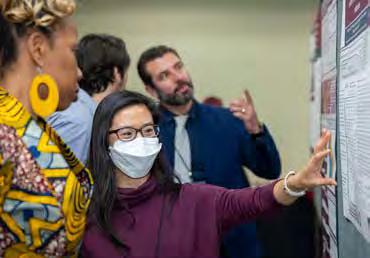


Outdoor based support for people living with dementia and their care partners
Trainee: Rachel Raj Rajendran Arulappan Supervisor: Anthea Innes (SOSCI)
A systematic review of paratransit
Trainee: Theodore Collins Supervisor: Léa Ravensbergen (SCI)
Opioid eduction and Enhanced Recovery in Orthopaedic Surgery (OREOS): A randomized controlled trial in knee replacement patients
Trainee: Melanie Mark Supervisor: Harsha Shanthanna (FHS)
Maternal high-fat diet accelerates aging and increases the incidence of liver cancer in aged mice offspring
Trainee: Shreya Sharma Supervisor: Deborah Sloboda (FHS)
“We need to be at the table”: A participatory mixed-methods evaluation of the impact and experience of older adult and caregiver partners in the McMaster Collaborative for Health and Aging
Trainee: Marfy Abousifein Supervisor: Soo Chan Carusone (FHS) and Brenda Vrkljan (FHS)
Impact of exogenous ketones on brain function in people with memory impairment
Trainee: Cara Pekos
Supervisor: Jeremy Walsh (SCI)

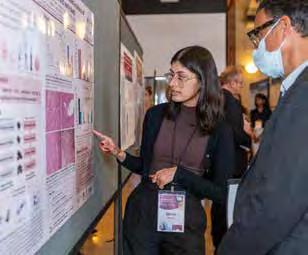
This year, McMaster celebrated the return of Léa Ravensbergen, a former MIRA-funded trainee, who rejoined the University as an associate professor in the school of earth, environment and society. Ravensbergen’s association with the Institute began through a 2019 MIRA Postdoctoral Fellowship focused on the intersection of geography and aging, investigating how the built environment and social dynamics impact the mobility and experiences of older adults.
Supported by MIRA and McMaster’s aging research community, Ravensbergen embarked on an impactful academic journey, securing prestigious fellowships at McGill University’s School of Urban Planning and Oxford University’s Transport Studies Unit.
In discussing MIRA’s impact of her academic journey, Ravensbergen emphasizes MIRA’s enriching impact on her research, citing interdisciplinary collaborations leading to diverse partnerships forged within and beyond academia. “Being part of MIRA not only shaped my research direction, it also exposed me to different disciplinary approaches to aging and provided an opportunity for community-engaged research with partners I still collaborate with today.”
Funding support played a crucial role in facilitating recruitment efforts, compensating participants, and disseminating research findings through open-access publications and conferences focused on aging research. Ravensbergen acknowledged MIRA’s assistance in recruiting undergraduate researchers, a contribution she highlighted during a presentation at the 2023 MIRA & Labarge Knowledge Exchange — an event that also featured a poster presentation from a MIRA-funded trainee working in Ravensbergen’s very own lab.

“I feel so lucky to have been supported by MIRA as an early career researcher, and I am honoured to continue the tradition as a faculty member, supporting a vibrant and interdisciplinary aging research community.”



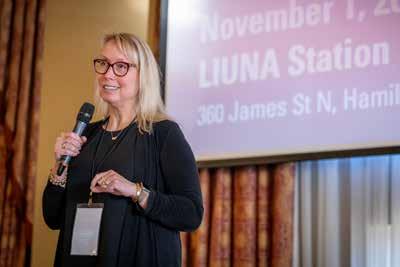
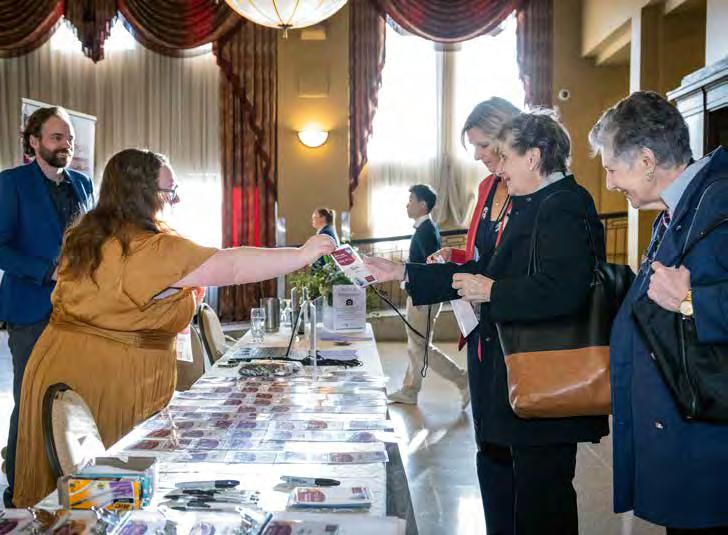
On November 1, the McMaster Institute for Research on Aging welcomed over 120 researchers, trainees and guests to LIUNA Station in downtown Hamilton for the 2023 MIRA & Labarge Knowledge Exchange. This vibrant event was a celebration of McMaster University’s aging research community, showcasing a year of remarkable success and progress in the field made possible by the continued support of McMaster’s former Chancellor, Suzanne Labarge.
The day commenced with a warm welcome from McMaster’s Vice-President, Research (acting), Andy Knights followed by MIRA’s scientific director Parminder Raina, who delivered a compelling year-in-review that highlighted the achievements of MIRA members and trainees. Emphasizing the interdisciplinary nature of MIRA-supported projects, Raina welcomed and celebrated the cross-disciplinary group present in the full ballroom, whose innovative approaches to research address the multifaceted challenges associated with aging.
The first research presentations of the day were a panel of McMaster faculty members sharing their high-impact projects. Showcasing the breadth and diversity of work supported by MIRA and Labarge funds, the research shared by Science, Social Sciences, Engineering and Business faculty members explored physical activity, age-friendly transport, technology-based mobility programs and the digital inequities faced by older adults.
Discussing MIRA’s footprint expanding from Hamilton to Toronto, the next session, chaired by Marla Beauchamp, associate scientific director of the MIRA | Dixon Hall Centre, emphasized the importance of connections between academia and local communities. The session highlighted ongoing expansion of MIRA Major Programs of Research to Dixon Hall and detailed existing and
growing programs to benefit this community. Building on a groundswell of support and collaboration, MIRA and Dixon Hall presented a direct pathway between research and those who can best use the outcomes.
In the early afternoon, guests Jotheeswaran Thiyagarajan and Christopher Mikton from the World Health Organization appeared remotely from Geneva, Switzerland. Their plenary presentation dove into MIRA’s contributions to the United Nations Decade of Healthy Ageing and an ongoing collaboration to develop a unified framework for older adult mobility measurement — shedding light on the specific and significant ways that MIRA impacts the future of aging research worldwide.
Over 50 trainees and early-career researchers presented new and innovative aging research in a lively poster competition between sessions. Fostering interaction and knowledge exchange, this annual feature of the event showcases the diversity and depth of new and boundarypushing aging research. A speed mentoring session following the Knowledge Exchange provided many of these trainees with further opportunities to network with research professionals and explore diverse career paths, ensuring the legacy of collaboration and innovation built by MIRA continues to thrive beyond academia.
The event concluded with heartfelt reflections from Suzanne Labarge, McMaster’s former chancellor and a generous supporter of aging research. Labarge commended the successes of MIRA and offered words of encouragement to attendees, as always inspiring continued dedication and fostering innovation in the aging sphere, from McMaster into the community and onto the international stage.
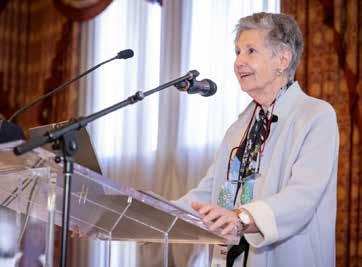

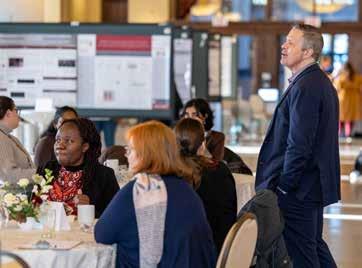
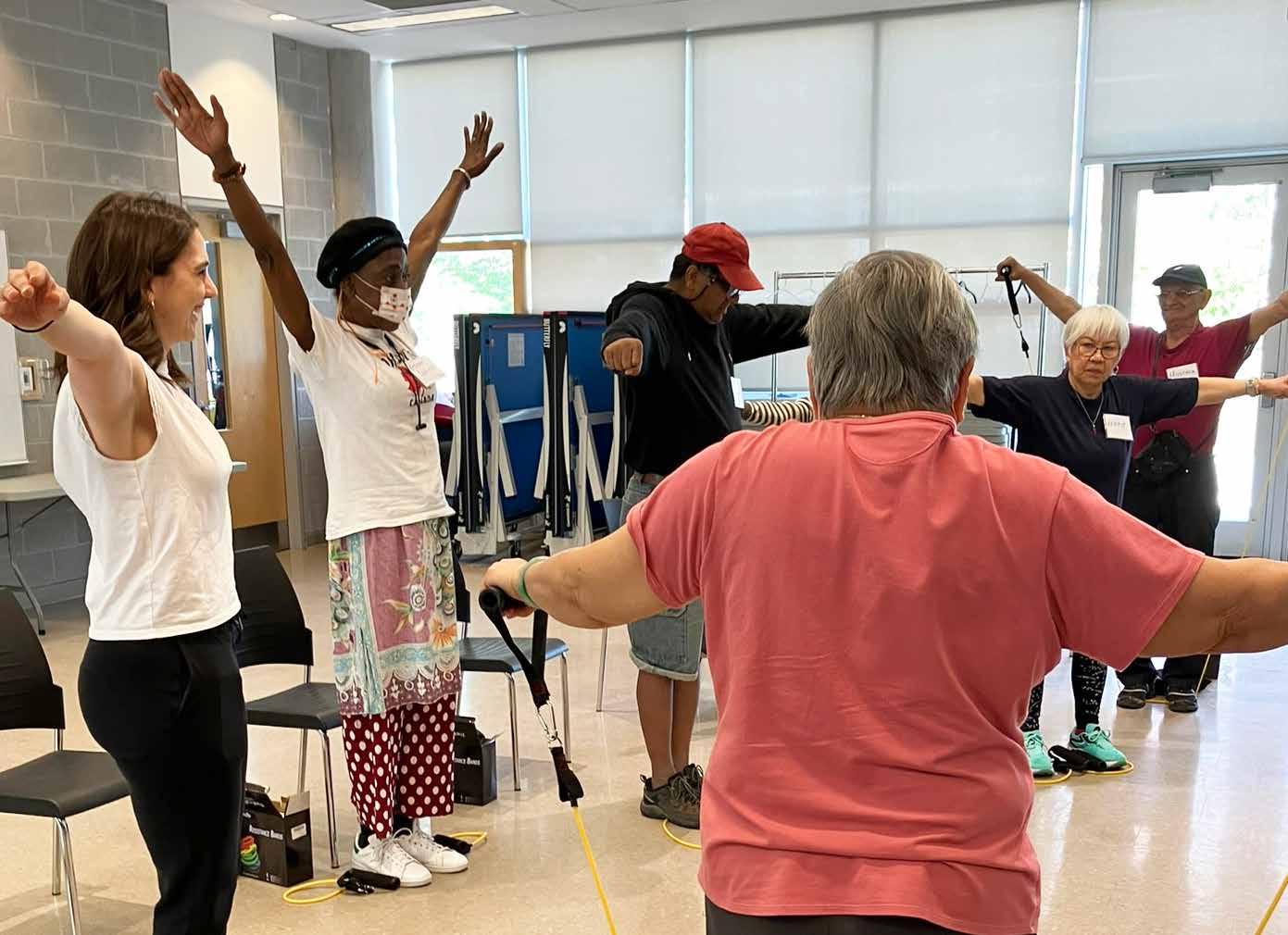
MIRA prioritizes user-centered solutions — integrating older adults into all stages of research and fostering a vibrant community network. In 2023, MIRA continued to engage with like-minded groups within McMaster and the wider Hamilton community on impact-driven aging research.
MIRA’s ability to connect the community with research opportunities, events and resources increased significantly in 2023 with the launch of Voice Canada and a revamp of the MIRA monthly Community Newsletter, which connects over 800 monthly subscribers with timely aging research information, resources and opportunities to engage.
On campus, MIRA’s Intergenerational Club facilitates connections between older adults and students through monthly meetups, featuring programming that includes a variety of social activities. This program has been successful in building aging research capacity at McMaster, but more importantly in developing understanding between generations. Our network of community partners was strengthened and expanded by participating in local aging related events such as the Alliance for Healthy Communities Conference in September 2023 and “Growing our

Age-Friendly Communities”, an event hosted by the Hamilton Council on Aging in partnership with the City of Hamilton’s Seniors Advisory Committee and the Age-Friendly Hamilton Community Collaborative in April 2023. Presentations on Voice Canada to the City of Hamilton’s Senior Advisory Council this year helped highlight the importance of community-engaged research.
Internationally, MIRA connects researchers with community partners to shape research directions. Collaborations with Hamilton Council on Aging and the University of Birmingham supported the University’s efforts in applying for an Age-Friendly City designation for the city of Birmingham. This aligns with the existing collaboration between MIRA and the University of Birmingham, supported by the BIRMAC Project and Ideas Fund, a seed fund established by the Institutions to support academic collaboration. Through genuine engagement with older adult stakeholders locally and globally, MIRA has cultivated a dynamic community network that shapes research, training and strategic direction, ensuring the Institute’s efforts are best aligned to support the health of older adults in ways that are most meaningful to them.
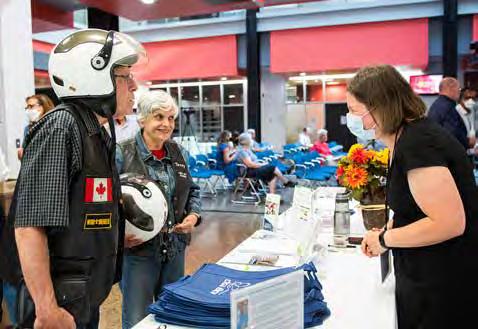



To strengthen the relationship between older adults and researchers, in 2023 MIRA launched Voice Canada, an online platform for community members to connect with, and participate in research studies; hear about upcoming research events; and help guide the work of researchers at all stages of the research process. Presented in Canada by MIRA, the Voice platform was created by the National Innovation Centre Ageing (NICA) at Newcastle University in the UK and represents an important international partnership and continued investment in a community of committed, connected research participants and community partners.
Voice Canada’s soft-launch event, “Shaping the Future of Aging,” was held on May 12 and featured a public talk by MIRA member Jennifer Heisz discussing the cognitive benefits of exercise for older adults. The event invited the Hamilton community to join Voice while enjoying a research fair that featured partner programs and studies, including the new Mobile User Experience Lab (MUXL), a one-of-a-kind mobile lab that brings research infrastructure to the community. This local launch is a first step in bringing together the insights of people from across Canada to help tell the story of what it means to grow older here.
Voice Canada has been launched with an eye to sustainable growth, ensuring a balanced ratio of community members to available research opportunities. As the first international partner of NICA to use the Voice platform after it was fully redesigned in 2022, MIRA continues to connect with and balance the needs of the research community as the UK Voice team expands and enhances the platform’s functionality. MIRA is now working with AGE-WELL to facilitate Voice’s expansion across Canada.
By leveraging Voice, MIRA disseminates content from resources such as the McMaster Optimal Aging Portal, amplifying the work of MIRA members, creating an integrated system where people can accessibly participate in research and are connected to trustworthy evidence-based resources. Through these efforts, Voice Canada is enriching the landscape of aging-related knowledge exchange and forging a deeper connection between older adults and the research process.
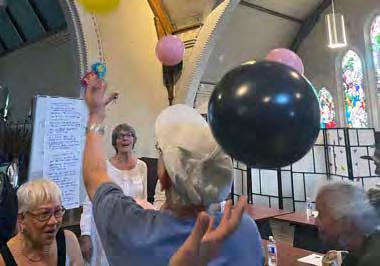

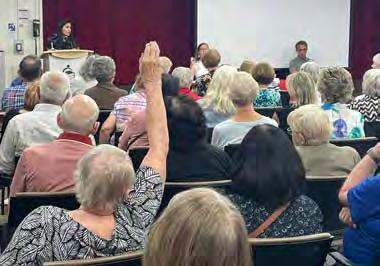
Throughout 2023, MIRA engaged with the older adult community at many impactful public events, often in the places where they already gather.
On October 6, International Day of Older Persons, MIRA and the McMaster Digital Transformation Research Centre’s (MDTRC) Mobile Experience Lab (MUXL) joined the City of Hamilton’s celebrations, introducing the MUXL as a mobile tool to increase accessibility to research projects. In June, MIRA staff (along with staff from affiliated projects) joined the Seniors’ Kick-off event at Sackville Hill Seniors’ Centre. MIRA’s Scientific Director Parminder Raina was an invited speaker at both the Burlington Seniors’ Symposium, hosted by MP Karina Gould and former Minister for Seniors Kamal Khera at the Burlington Public Library, and the Senior’s Housing Symposium hosted by the City of Oakville at Sir John Colborne Recreation Centre for Seniors. At these talks, MIRA staff connected with community members; sharing information about MIRA initiatives, the Optimal Aging Portal and the Canadian Longitudinal Study on Aging (CLSA). MIRA’s program manager, Allison Dubé, represented the Institute at Schlegel Village’s Green Bench Gala and the launch of their Pursuit of Passions x #ElderWisdom art exhibit at the Art Gallery of Hamilton, building on established community partnerships while promoting the artistic expression of older adults.
MIRA’s reach extended to Toronto’s downtown as the MIRA | Dixon Hall Centre took part in the 2023 Progress Place Senior’s Forum, where older adult clients from Dixon Hall showed their talents through musical and dance performances. MIRA trainee Constance Dupuis led an interactive session focused on combating social isolation, and MIRA and Dixon Hall staff fostered meaningful interactions with this community, streamlining connections that enhance and guide our direction while positioning MIRA as a trusted source of essential information.
MIRA’s public engagement through events has provided a vital opportunity to build trust and relationships; share research findings, tools and initiatives; and gain essential perspective and insight from the older adult community in an accessible (and enjoyable) way. The invaluable input and engagement of community members strengthens and guides MIRA’s depth of impact in enhancing the quality of life for older adults from Hamilton to Toronto and beyond.
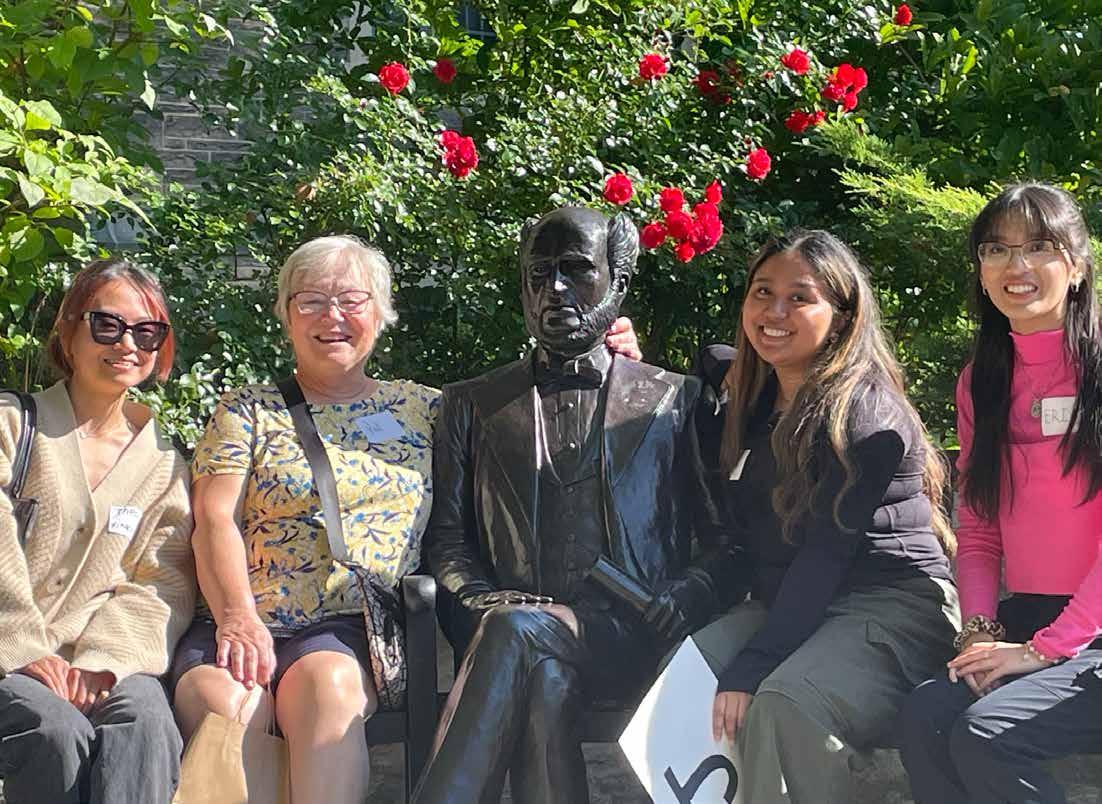
In 2023, We deepened our connections with older adults and the people who care about them through a series of engaging public events and initiatives.
In partnership with the Gilbrea Centre for Studies in Aging, MIRA organized the inaugural Older Adult Open Campus Day, welcoming 50 older adults from the local community and over 70 students, who, together, learned about the exciting work happening at McMaster through activities and tours hosted by 16 of the most engaging facilities across campus, including several MIRA member labs. This event fostered intergenerational connections while introducing all participants to research happening across McMaster’s vibrant and varied environment.
MIRA’s ability to meaningfully engage and learn from older adults continues to expand through the MIRA | Dixon Hall Centre, which in 2023 made significant efforts to weave aging research into the community it serves. To offer valuable guidance, insight and feedback on research initiatives and Centre events, Dixon Hall established a Community Advisory Group of eight highly engaged older adults and three frontline Dixon Hall staff. The MIRA | Dixon Hall Centre also hosted a Town Hall, focused on priority-setting and creating a shared understanding of how our two organizations can work together to support and strengthen research and older adult communities. Through interactive design thinking and idea sharing activities, MIRA and Dixon Hall staff created a collective understanding of shared priorities to guide appropriate and accessible areas for future research engagement.
Emerging from these discussions at Dixon Hall, the Snacks and Science series began in spring 2023 to bring the latest and best research findings on priority areas directly to Dixon Hall staff, service partners and the community. The first installment featured a presentation by Anthea Innes on Dementia-Friendly Spaces to an audience of over 75 attendees. In October, this framework was adapted to present Building Communities for Aging Better, a panel presentation by members of MIRA’s visiting International Scientific Advisory Committee. This event provided a valuable opportunity for community members and Dixon Hall staff to dialogue with aging researchers from around the world. We were proud to facilitate an opportunity for each group to share insights on what makes a community a good place to age.
From intergenerational to international, MIRA’s efforts continue to nurture and develop collaborations between older adults and research communities, strengthening both in the process.
at the MIRA | Dixon Hall Centre
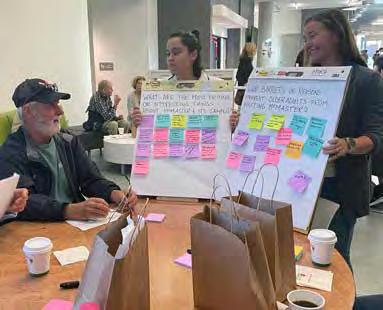
How might we...
identify those who are socially isolated? support older adults in navigating technology? make aging smoother and more successful? incentivize older adults to prioritize their health?
Here are the themes we saw:
Loneliness, social isolation & emotional well-being
Housing & aging in place
Precarity, financial well-being & food security
Physical and cognitive decline
Technology access and competency
System navigation
Ageism, vulnerability and loss of agency
Language and culture
leverage public health identify seniors’ needs? coordinate strategies to help with addictions?
If I could run any program or service for older adults…
“go-along service, escorting clients to appointments, groceries”
“multiple generations cooking together, teaching about culture and traditions”
“a mobile food, service and care clinic”
“a senior and youth co-housing program”
Increasing PSW jobs and salaries
More hospital beds and healthcare workers
More community services and spaces
Sidewalk clearing can enable mobility
Which of the following roles or experiences do you identify with?
7 I am an older adult
9 I am a caregiver to an older adult
22 My work or research is connected to aging or older adults
24 I provide service directly to older adults
30 I have older adult friends or relatives
Great programs & services are...
Culturally competent
Affordable (or free!)
Accessible with transportation
Fun and not “uncool”
On weekends sometimes – people get lonely!
The McMaster Optimal Aging Portal continues to grow as a key resource to support older adults, caregivers, clinicians, public health professionals, social system professionals and policymakers from around the world who are looking for a trusted source of evidence-based information about the health and social aspects of aging.
This year, the Portal further expanded its content offerings, producing enhanced multimedia, including video blog posts and eLearning lessons. The team also continued to host health and wellness webinars in collaboration with McMaster Advancement that saw considerable attendance across events throughout the year.
A grant from the Public Health Agency of Canada led to the development of enhanced multimedia content around dementia risk reduction. Video blog posts, eLearning lessons, an email series and marketing collateral were developed to raise awareness of dementia risk factors amongst adults 35 and older.
6,000,000 5,000,000 4,000,000 3,000,000 2,000,000 1,000,000 0
5,457,822 users since the Portal launched in 2016 Each year better than the previous
Geographic distribution of Portal users around the globe
Total 100% 1,664,658

2023
• 470 Blog posts
• 350+ Hitting the headlines news summaries
• 1,100 Evidence summaries
• 3,200 Web resource ratings
• 202 Patient decision aids
• 54,200+ Scientific articles for healthand social system professionals
• 8 e-learning modules*
• 36 Video posts*
In 2023, the Portal continued to expand its catalogue of multimedia content with the publication of an additional e-learning module and 16 video posts featuring McMaster experts discussing a range of topics on healthy aging. User engagement and satisfaction with these new forms of content are very high, as evidenced by survey responses and engagement with features such as online quizzes and downloads of custom resources.
Statistics (October 1, 2022 – September 30, 2023)
Website analytics for 2022 (January 1 to November 30 2023)
Social media (January 1 to November 30 2023)
Sustainability | Efforts toward securing the long-term sustainability of the Portal continued during 2023.
The initial funding provided generously by Suzanne Labarge ($5 million for Portal & stakeholder engagement), other contributions from Labarge Optimal Aging Initiative, various McMaster University entities ($740K between 2017 and 2022, and $400K in 2023), and AGE-WELL funding ($450K for 2019 to March 2022) have sustained the Portal over the past ten years. We are thankful for the ability to continue to leverage funds from the Portal scientific leads’ other funding sources (estimated at close to 4.5 million over the past eleven years).
In 2023, additional contributions from McMaster University’s Faculty of Health Sciences, the Office of the Vice-President, Research, the Provost, and the MIRA | Dixon Hall Centre were confirmed (under MIRA’s leadership) to help support the Portal operations in 2023 and 2024.
MIRA and the portal team continues their efforts to secure long-term funding to ensure financial sustainability, while implementing innovations to make the Portal more enticing to a broader audience, all while ensuring that the Portal content and website remain independent and non-biased.
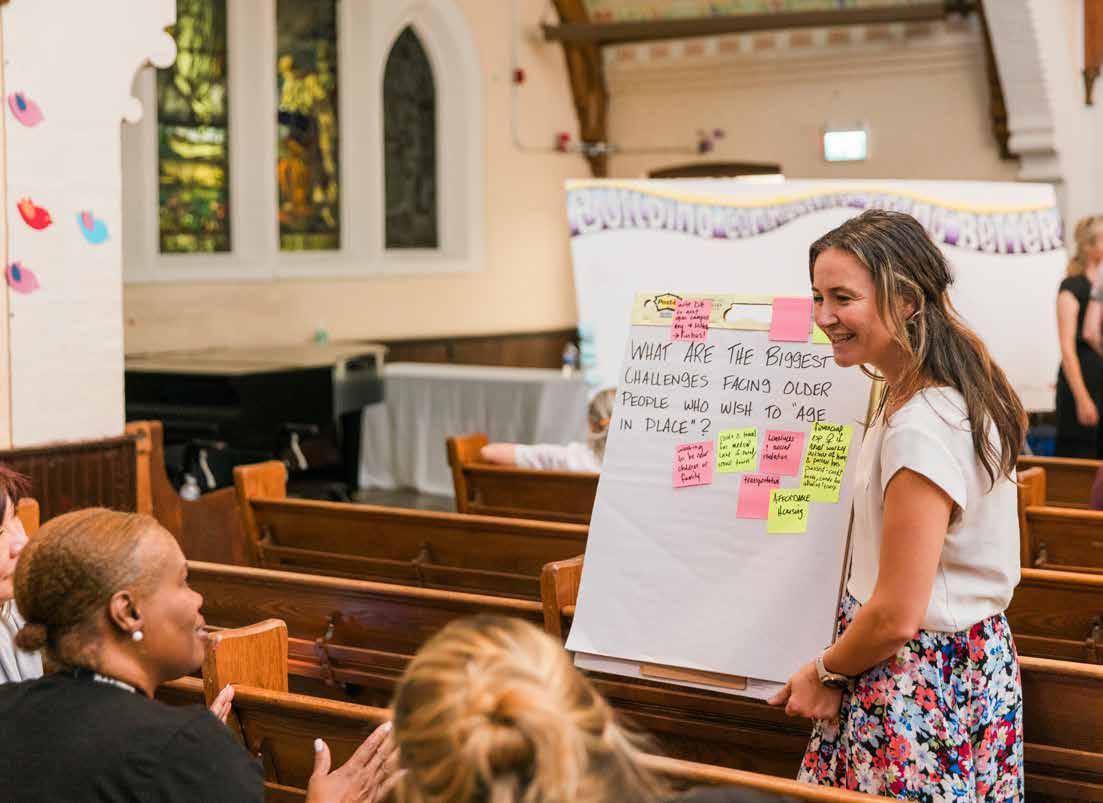

Parminder Raina Scientific Director

Gésine Alders Research Coordinator

Amy Ladouceur Communications Assistant

Marla Beauchamp Associate Scientific Director, MIRA | Dixon Hall Centre

Ine Wauben Executive Director

Allison Dubé Project Manager

Alison Outtrim Program Coordinator

Casey Irvin Communications Coordinator

Audrey Patocs Research Manager
Phone: 905-525-9140, ext. 21723
mira.mcmaster.ca